Photos show the luxury mega yachts that belong to Russian oligarchs — some of whom have hidden their ships as the UK ramps up sanctions.
- Sanctions targeting Russian oligarchs threaten their luxury assets — including their mega yachts.
- Many countries have implemented sanctions targeting Putin and Russian oligarchs following Russia's attack on Ukraine.
- Insider compiled a photo list of some of the luxury vessels.

Russian billionaires' assets — including their megayachts — are in danger of being seized as countries continue to impose sanctions on Russian oligarchs in response to Russia's invasion of Ukraine.
US President Joe Biden announced that the US will make a substantial effort to seize Russian oligarchs' assets.
"We are joining with our European allies to find and seize your yachts, your luxury apartments, your private jets," Biden said in his State of The Union address on March 1. "We are coming for your ill-begotten gains."
Since the US is not in "armed conflict" with Russia it may be legally tricky to seize assets like yachts, Insider reported .
"The threshold for seizing assets under sanctions is that the US has to be in armed conflict with the owner of the assets," Brian O'Toole, an economic sanctions expert, tweeted last Friday. "The idea of turning Russian corruption into Ukrainian assistance is lovely but this idea is illegal, period."
It can also be difficult to find out who the owners of these yachts are.
Offshore companies typically own the luxury vessels, but enough "public speculation" pointing to a Russian oligarch as an owner is likely "sufficient for a seizure," Insider reported .
Many of the oligarchs moved their yachts to places where they can't be seized, such as the Maldives, which does not have an extradition treaty with the US.
Insider has compiled a list of photos with mega yachts linked to Russian oligarchs.

Galactica Super Nova
Amid sanctions and seizures targeting Russian billionaires, Galactica Super Nova — said to be linked to the CEO of Russian oil firm Lukoil — is no longer detectable via ship tracker site MarineTraffic , The Daily Beast reported Thursday.
The superyacht — whose owner is named Vagit Alekperov — had just been in Montenegro last week, Insider reported .
Alekperov is not currently the target of any sanctions.
The yacht is almost 230 feet long and can hold up to 12 guests and 16 crew members, according to the ship maker Heesen Yachts .
The ship also has a helicopter pad that can turn into an outdoor movie theatre, also according to the ship maker.
The Amore Vero
France seized Amore Vero, a 281-foot megayacht linked to oligarch and politician Igor Sechin, on March 3.
The yacht, Amore Vero, is estimated to have a value of $120 million . It has a swimming pool that doubles as a helicopter pad and a private deck for its owner, according to Oceana , the ship maker.
Per The Wall Street Journal , officials believe that Amore Vero is "owned by a company whose majority shareholder was Mr. Sechin," though the outlet does not provide the name of the company.
Sechin is the CEO of Rosneft, Russia's oil giant, and a former deputy prime minister. A known Putin ally , he was sanctioned by both the EU and the US before France seized his yacht last week .
Sechin was one of seven oligarchs sanctioned by the UK on Thursday.
People in Russia have referred to Sechin as "Darth Vader" and "the scariest man on Earth," according to The Guardian .
Alisher Usmanov has been sanctioned by the EU, the US, the UK, and Switzerland. His boat remains in Germany, but the country says it hasn't seized it.
Usmanov's Dilbar is "is the largest motor yacht in the world by gross tonnage," according to Lürssen , the German ship's maker.
It's 512-foot long and weighs 15,917 tons. The ship has been docked in Germany for months undergoing a "refitting," but last week Forbes reported that it was unable to leave the dock.
Germany, however, has denied that it formally seized Dilbar.
Forbes said that "the German federal customs agency is the 'responsible enforcement authority' and would have to issue an export waiver for the yacht to leave, and that 'no yacht leaves port that is not allowed to do so.'"
Still, multiple outlets reported that Usmanov has fired the crew on the Dilbar.
The Uzbekistan-born oligarch is a supporter of Putin.
"I am proud that I know Putin, and the fact that everybody does not like him is not Putin's problem," Usmanov told Forbes in a 2010 interview.
Suleyman Kerimov was sanctioned by the US, and his son, Said Kerimov, owns ICE. The superyacht is worth is an estimated $170 million.
The Kerimov family owns the majority of Polyus Gold, Russia's biggest gold producer .
ICE was dubbed "Superyacht of the Year" in 2006 at the World Super Yacht Awards, according to Boat International . It is approximately 300 feet and has its own resident helicopter, according to Club Yacht .
Quantum Blue
Sergey Galitsky's ship, Quantum Blue, has an estimated value of $250 million and is last known to be docked in Monaco.
Galitsky is the founder of one of Russia's largest supermarket chains, Magnit.
His name is not currently on the list of sanctioned Russian oligarchs,
Though he also is not the target of any current sanctions, Vladimir Potanin's superyacht, Nirvana, is one of at least four ships docked in the Maldives .
Potanin is the Former First Deputy Prime Minister of Russia and was a longtime trustee for the Guggenheim museum before stepping down on March 2, according to The New York Times .
Nirvana is not Potanin's only superyacht, he also owns another named Barbara, according to Fortune .
Alexander Abramov's Titan, Alexei Mordashovis' Nord, and Oleg Deripaska's Clio are also located in the Maldives.
At 533 feet long, Roman Abramovich's Eclipse was the largest yacht on the globe until 2013 when the 590-foot Azzam overthrew it.
Abramovich, once Russia's richest man , is the departing owner of Chelsea FC soccer club. He was sanctioned by the UK on Thursday along with six other oligarchs, Insider reported .
The luxury boat has a host of amenities, including two helicopter pads, a missile detection system, and a swimming pool more than 50 feet long. It also has space for up to 36 guests and 70 crew members, according to Yacht Harbour .
Insider previously reported that it is currently docked in the Caribbean .
Another yacht named Solaris is linked to Abramovich. The vessel, worth approximately $600 million, left Spain Tuesday after having been under repair since late 2021, Insider reported.
Solaris is 460 feet and can host a total of 36 guests, according to SuperYachtFan .
Tango, owned by the US-sanctioned Viktor Vekselberg, is currently located in Palma, Spain.
Tango can host up to 14 people and is 254 feet long, won the 2012 World Superyacht Awards, and has an estimated worth of $120 million, according to SuperYachtFan .
Vekselberg is a Ukrainian-born businessman who owns Renova, a Russian conglomerate, according to The Guardian .
He was one of nearly two dozen Russian oligarchs and officials that the US sanctioned on Friday.
The US Treasury Department claims that he has close ties with Putin, and has announced that assets such as his $90 million jet and his superyacht Tango have been frozen, Insider reported .
Graceful, a yacht reported to belong to Russian President Vladimir Putin, left Germany just before his invasion of Ukraine, Insider reported in early February.
—Manu Gómez (@GDarkconrad) February 9, 2022
Graceful is 270 feet long and has a saloon, gym, spa, library, and an indoor pool nearly 50 feet long that doubles as a dance floor.
Scheherazade
A mystery yacht remains untouched as the owner remains a mystery.
The owner of the 459-foot Scheherazade is suspected to be a Russian billionaire, though the owner was never publically identified, The New York Times reported .
Many people believe it belongs to Vladimir Putin, nicknaming the vessel "Putin's Yacht."
SuperYachtFan estimates the ship's value sits at $700 million.
Stella Maris
Stella Maris is linked to oil and gas tycoon Rashid Sardarov. It was last seen in Nice, France, according to The Washington Post .
The luxury vessel is priced at $75 million, is 237 feet long, and can hold up to 14 guests, per SuperYachtFan .
Sardarov is not being sanctioned.
Sailing Yacht A
Sailing Yacht A is believed to belong to Andrey Melnichenko. The boat was seized by Spanish officials Saturday, Reuters reported .
The ship is more than 465 feet long and can hold up to 20 guests, according to SuperYachtFan . The website says that Sailing Yacht A also features an underwater observation area and has a value of more than $500 million.
Melnichenko is an EU-sanctioned Russian billionaire who works in coal and fertilizers, according to Forbes . The magazine also reported that he owns a second yacht, Motor Yacht A, which is similar to a submarine.
Oligarch Gennady Timchenko's superyacht "Lena" was seized in the port of Sanremo, Italy on March 5, Reuters reported.
Timchenko is the owner of a private investment group, Volga Group and a shareholder of Bank Rossiya. The oligarch has been sanctioned by the EU, which describes him as a "long-time acquaintance of the President of the Russian Federation Vladimir Putin."
Timchenko was also sanctioned by the UK on February 22.
The superyacht is valued at around 50 million euros ($54 million), Reuters reported. It has fold-down terraces, as well as an "owner's suite" which opens out onto the sea with "gull-wing doors," according to its manufacturer, Sanlorenzo.
Italian authorities also seized a $71 million super-yacht belonging to one of the wealthiest men in Russia , Alexei Mordashov.
The 215-ft "Lady M" superyacht was seized in the Port of Imperia, northern Italy, a source confirmed to Reuters.
The yacht can accommodate up to six guests on and also has accommodation for four crew members, per the Superyacht Times .
The oligarch, who is the chairman of steel mining company, Severstal, has also been sanctioned by the EU, which says Mordashov is "benefiting from his links with Russian decision-makers." Mordashov has insisted he has "absolutely nothing to do" with Russia's attack on Ukraine.
The Oligarch moved $1.3 billion worth of shares in travel company, TUI, to an offshore tax haven on the day he was hit by sanctions, Insider's Huileng Tan previously reported.
He was also added to the UK government's sanctions list on March 15.
Some superyachts belonging to Russian billionaires are currently seeking refuge in the Maldives, including a yacht owned by billionaire Oleg Deripaska, Reuters reported.
The billionaire, who is also the founder of one of Russia's largest industrial groups, Basic Element, was added to the UK's sanctions list on March 10.
Also built by Lürssen, the superyacht - which is around 238 feet long - can accommodate 18 guests in nine cabins, per Superyacht Fan.
The superyacht Valerie - worth $140 million - was seized in Barcelona on Monday, Spanish Prime Minister, Pedro Sanchez, said on La Sexta television, per Reuters.
Sanchez did not confirm the owner of the yacht, but two sources confirmed to Reuters that it belonged to Sergei Chemezov, who is said to be a close ally of Putin.
The oligarch, who was previously a KGB spy with Putin in the former Soviet Union, recently said that Russia would emerge victorious from Western sanctions, Reuters previously reported .
Chemezov, who is the CEO of Russian defense conglomerate Rostec was added to the US sanctions list on March 3.
His yacht is 279 feet long and can accommodate 17 guests in eight suites, per Superyacht Fan.
Crescent, most likely owned by Igor Sechin but also rumored to belong to Putin, was the third yacht Spain seized as the West ramps up sanctions, The Washington Post reported Thursday.
The superyacht is 443-feet long and costs an estimated $600 million, according to SuperyachtFan, which also says the vessel hosts a retractable helicopter hangar and a large pool with a glass bottom.
Lady Anastasia
Lady Anastasia is owned by Russian oligarch Alexander Mikheyev but was seized by Spain on Tuesday, according to Reuters .
The boat is almost 160 feet long and can hold up to 10 guests, according to Yacht Harbour .
Mikheyev, who was sanctioned by the EU, is the head of a helicopters division under Rostec, New York Mag reported .
- Main content
- Election 2024
- Entertainment
- Newsletters
- Photography
- AP Buyline Personal Finance
- Press Releases
- Israel-Hamas War
- Russia-Ukraine War
- Global elections
- Asia Pacific
- Latin America
- Middle East
- March Madness
- AP Top 25 Poll
- Movie reviews
- Book reviews
- Personal finance
- Financial Markets
- Business Highlights
- Financial wellness
- Artificial Intelligence
- Social Media
US seizes yacht owned by oligarch with close ties to Putin
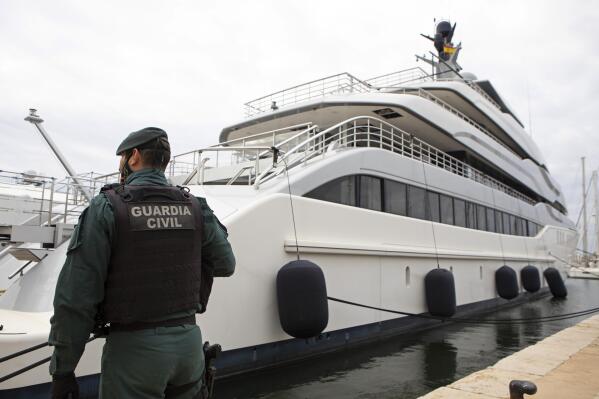
A Civil Guard stands by the yacht called Tango in Palma de Mallorca, Spain, Monday April 4, 2022. U.S. federal agents and Spain’s Civil Guard are searching the yacht owned by a Russian oligarch. The yacht is among the assets linked to Viktor Vekselberg, a billionaire and close ally with Russia’s President Vladimir Putin, who heads the Moscow-based Renova Group, a conglomerate encompassing metals, mining, tech and other assets, according to U.S. Treasury Department documents. All of Vekselberg’s assets in the U.S. are frozen and U.S. companies are forbidden from doing business with him and his entities. (AP Photo/Francisco Ubilla)
Civil Guards accompany U.S. FBI agents and a U.S.Homeland Security agent from the yacht called Tango in Palma de Mallorca, Spain, Monday April 4, 2022. U.S. federal agents and Spain’s Civil Guard are searching the yacht owned by a Russian oligarch. The yacht is among the assets linked to Viktor Vekselberg, a billionaire and close ally with Russia’s President Vladimir Putin, who heads the Moscow-based Renova Group, a conglomerate encompassing metals, mining, tech and other assets, according to U.S. Treasury Department documents. (AP Photo/Francisco Ubilla)
A U.S. federal agent leaves the yacht called Tango in Palma de Mallorca, Spain, Monday April 4, 2022. U.S. federal agents and Spain’s Civil Guard are searching the yacht owned by a Russian oligarch. The yacht is among the assets linked to Viktor Vekselberg, a billionaire and close ally with Russia’s President Vladimir Putin, who heads the Moscow-based Renova Group, a conglomerate encompassing metals, mining, tech and other assets, according to U.S. Treasury Department documents. (AP Photo/Francisco Ubilla)
A Civil Guard officer accompanies a U.S.Homeland Security agent and an FBI agent from the yacht called Tango in Palma de Mallorca, Spain, Monday April 4, 2022. U.S. federal agents and Spain’s Civil Guard are searching the yacht owned by a Russian oligarch. The yacht is among the assets linked to Viktor Vekselberg, a billionaire and close ally with Russia’s President Vladimir Putin, who heads the Moscow-based Renova Group, a conglomerate encompassing metals, mining, tech and other assets, according to U.S. Treasury Department documents. (AP Photo/Francisco Ubilla)
A U.S. federal agent and two Civil Guards board the yacht called Tango in Palma de Mallorca, Spain, Monday April 4, 2022. U.S. federal agents and Spain’s Civil Guard are searching the yacht owned by a Russian oligarch. The yacht is among the assets linked to Viktor Vekselberg, a billionaire and close ally with Russia’s President Vladimir Putin, who heads the Moscow-based Renova Group, a conglomerate encompassing metals, mining, tech and other assets, according to U.S. Treasury Department documents. All of Vekselberg’s assets in the U.S. are frozen and U.S. companies are forbidden from doing business with him and his entities. (AP Photo/Francisco Ubilla)
Civil Guards stand by the yacht called Tango in Palma de Mallorca, Spain, Monday April 4, 2022. U.S. federal agents and Spain’s Civil Guard are searching the yacht owned by a Russian oligarch. The yacht is among the assets linked to Viktor Vekselberg, a billionaire and close ally with Russia’s President Vladimir Putin, who heads the Moscow-based Renova Group, a conglomerate encompassing metals, mining, tech and other assets, according to U.S. Treasury Department documents. All of Vekselberg’s assets in the U.S. are frozen and U.S. companies are forbidden from doing business with him and his entities. (AP Photo/Francisco Ubilla)
A U.S. federal agent walks past two Civil Guards on the yacht called Tango in Palma de Mallorca, Spain, Monday April 4, 2022. U.S. federal agents and Spain’s Civil Guard are searching the yacht owned by a Russian oligarch. The yacht is among the assets linked to Viktor Vekselberg, a billionaire and close ally with Russia’s President Vladimir Putin, who heads the Moscow-based Renova Group, a conglomerate encompassing metals, mining, tech and other assets, according to U.S. Treasury Department documents. All of Vekselberg’s assets in the U.S. are frozen and U.S. companies are forbidden from doing business with him and his entities. (AP Photo/Francisco Ubilla)
Civil Guards officers accompany identified people from the yacht called Tango in Palma de Mallorca, Spain, Monday April 4, 2022. U.S. federal agents and Spain’s Civil Guard are searching the yacht owned by a Russian oligarch. The yacht is among the assets linked to Viktor Vekselberg, a billionaire and close ally with Russia’s President Vladimir Putin, who heads the Moscow-based Renova Group, a conglomerate encompassing metals, mining, tech and other assets, according to U.S. Treasury Department documents. (AP Photo/Francisco Ubilla)
A Civil Guard and a police dog walk off the yacht called Tango in Palma de Mallorca, Spain, Monday April 4, 2022. U.S. federal agents and Spain’s Civil Guard are searching the yacht owned by a Russian oligarch. The yacht is among the assets linked to Viktor Vekselberg, a billionaire and close ally with Russia’s President Vladimir Putin, who heads the Moscow-based Renova Group, a conglomerate encompassing metals, mining, tech and other assets, according to U.S. Treasury Department documents. All of Vekselberg’s assets in the U.S. are frozen and U.S. companies are forbidden from doing business with him and his entities. (AP Photo/Francisco Ubilla)
- Copy Link copied
PALMA DE MALLORCA, Spain (AP) — The U.S. government on Monday seized a 254-foot yacht in Spain owned by an oligarch with close ties to Russian President Vladimir Putin, a first by the Biden administration under sanctions imposed after the Kremlin’s invasion of Ukraine and targeting pricey assets of Russian elites .
Spain’s Civil Guard and U.S. federal agents descended on the Tango at the Marina Real in the port of Palma de Mallorca, the capital of Spain’s Balearic Islands in the Mediterranean Sea. Associated Press reporters at the scene saw police going in and out of the boat.
The U.S. Justice Department, which obtained a warrant from a federal judge in Washington, alleges the yacht should be forfeited for violating U.S. bank fraud, money laundering and sanctions statutes.
Superyachtfan.com, a specialized website that tracks the world’s largest and most exclusive recreational boats, values the 78-meter vessel, which carries the Cook Islands flag, at $120 million.
The yacht is among the assets linked to Viktor Vekselberg , a billionaire and close Putin ally who heads the Moscow-based Renova Group, a conglomerate encompassing metals, mining, tech and other assets, according to U.S. Treasury Department documents.
All of Vekselberg’s assets in the United States are frozen and American companies are barred from doing business with him and his entities. The Ukrainian-born businessman built his fortune by investing in the aluminum and oil industries in the post-Soviet era.
Prosecutors allege Vekselberg bought the Tango in 2011 and has owned it since then, though they believe he has used shell companies to try to obfuscate his ownership and to avoid financial oversight.
They contend Vekselberg and those working for him continued to make payments using U.S. banks to support and maintain the yacht, even after sanctions were imposed on him in 2018. Those payments included a stay in December 2020 at a luxury water villa resort in the Maldives and fees to moor the yacht.
It’s the first U.S. seizure of an oligarch’s yacht since U.S. Attorney General Merrick Garland and U.S. Treasury Secretary Janet Yellen assembled a task force known as REPO — short for Russian Elites, Proxies and Oligarchs — as an effort to enforce sanctions after Russia invaded Ukraine in late February.
“It will not be the last.” Garland said in a statement. “Together, with our international partners, we will do everything possible to hold accountable any individual whose criminal acts enable the Russian government to continue its unjust war.”
Vekselberg has long had ties to the U.S., including a green card he once held and homes in New York and Connecticut. He was also questioned in special counsel Robert Mueller’s investigation into Russian interference in the 2016 U.S. presidential election and has worked closely with his American cousin, Andrew Intrater, who heads the New York investment management firm Columbus Nova.
Vekselberg and Intrater were thrust into the spotlight in that investigation after the lawyer for adult film star Stormy Daniels released a memo that claimed $500,000 in hush money was routed through Columbus Nova to a shell company set up by Donald Trump’s personal attorney, Michael Cohen. Columbus Nova denied that Vekselberg played any role in its payments to Cohen.
Vekselberg and Intrater met with Cohen at Trump Tower, one of several meetings between members of Trump’s inner circle and high-level Russians during Trump’s 2016 campaign and the transition before his presidency.
The 64-year-old Vekselberg founded Renova Group more than three decades ago. The group holds the largest stake in United Co. Rusal, Russia’s biggest aluminum producer, among other investments.
Vekselberg was first sanctioned by the U.S. in 2018, and again in March of this year, shortly after the invasion of Ukraine began. Vekselberg has also been sanctioned by authorities in the United Kingdom.
The yacht sails under the Cook Islands flag and is owned by a company registered in the British Virgin Islands administered by different societies in Panama, the Civil Guard said, “following a complicated financial and societal web to conceal its truthful ownership.”
Agents confiscated documents and computers inside the yacht that will be analyzed to confirm he real identity of the owner, it said.
The U.S. Justice Department has also launched a sanctions enforcement task force known as KleptoCapture, which also aims to enforce financial restrictions in the U.S. imposed on Russia and its billionaires, working with the FBI, the U.S. Treasury and other federal agencies. That task force will also target financial institutions and entities that have helped oligarchs move money to dodge sanctions.
The White House has said that many allied countries, including German, the United Kingdom, France, Italy and others are involved in trying to collect and share information against Russians targeted for sanctions. In his State of the Union address on March 1, President Joe Biden warned oligarchs that the U.S. and European allies would “find and seize your yachts, your luxury apartments, your private jets.”
“We are coming for your ill-begotten gains,” he said.
Monday’s capture is not the first time Spanish authorities have been involved in the seizure of a Russian oligarch’s superyacht. Officials said they had seized a vessel valued at over $140 million owned by the CEO of a state-owned defense conglomerate and a close Putin ally.
French authorities have seized superyachts, including one believed to belong to Igor Sechin, a Putin ally who runs Russian oil giant Rosneft, which has been on the U.S. sanctions list since Russia annexed Crimea in 2014.
Italy has seized several yachts and other assets.
Italian financial police moved quickly seizing the superyacht Lena belonging to Gennady Timchenko, an oligarch close to Putin, in the port of San Remo; the 65-meter (215-foot) Lady M owned by Alexei Mordashov in nearby Imperia, featuring six suites and estimated to be worth 65 million euros; as well as villas in Tuscany and Como, according to government officials.
Parra reported from Madrid and Balsamo reported from Washington.
Russian oligarch's yacht costs U.S. taxpayers close to $1 million a month
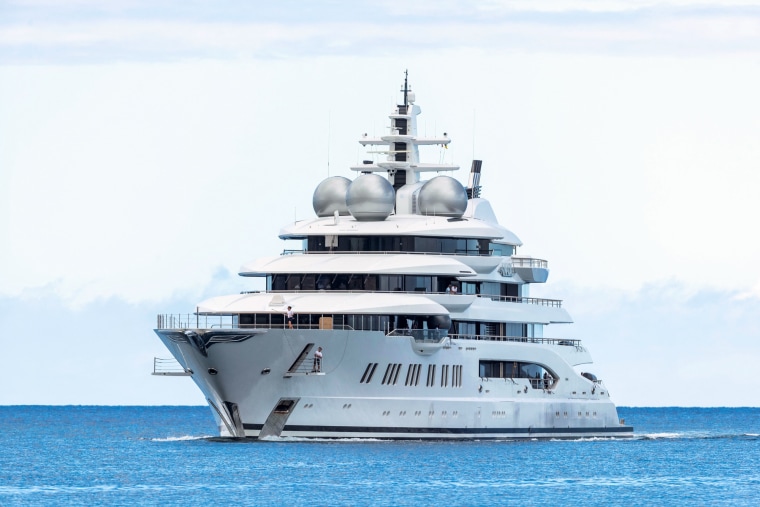
A mega-yacht seized by U.S. authorities from a Russian oligarch is costing the government nearly $1 million a month to maintain, according to new court filings.
The U.S. Department of Justice is seeking permission to sell a 348-foot yacht called Amadea, which it seized in 2022, alleging that it was owned by sanctioned Russian billionaire Suleiman Kerimov. The government said it wants to sell the $230 million yacht due to the “excessive costs” of maintenance and crew, which it said could total $922,000 a month.
“It is excessive for taxpayers to pay nearly a million dollars per month to maintain the Amadea when these expenses could be reduced to zero through [a] sale,” according to a court filing by U.S. prosecutors on Friday.
The monthly charges for Amadea, which is now docked in San Diego, California, include $600,000 per month in running costs: $360,000 for the crew; $75,000 for fuel; and $165,000 for maintenance, waste removal, food and other expenses. They also include $144,000 in monthly pro-rata insurance costs and special charges including dry-docking fees, at $178,000, bringing the total to $922,000, according to the filings.
The battle over Amadea and the costs to the government highlight the financial and legal challenges of seizing and selling assets owned by Russian oligarchs after the country’s invasion of Ukraine. European Commission President Ursula von der Leyen said last week that the European Union should use profits from more than $200 billion of frozen Russian assets to fund Ukraine’s war effort.
Her comments echoed government calls in the spring of 2022 to freeze the yachts, private jets and mansions of Russian billionaires in hopes of putting pressure on Russian President Vladimir Putin and raising money for the war effort.
Yet, nearly two years later, the legal process for proving ownership of the Russian assets and selling them has proven to be far more time-consuming and costly. In London, Russian billionaire Eugene Shvidler has waged a court battle over his private jets that were impounded, and Sergei Naumenko has been appealing the detention of his superyacht Phi.
The battle over Amadea began in April 2022, when it was seized in Fiji at the request of the U.S. government, according to the court filings.
Though the U.S. alleges that the yacht is owned by Kerimov, who made his fortune in mining, attorneys for Eduard Khudainatov, an ex-Rosneft CEO who has not been sanctioned, say he owns the yacht, and have sought to take back possession of the vessel.
In court filings, Khudainatov’s attorneys have objected to the U.S. government’s efforts to sell the yacht, saying a rushed sale could lead to a distressed sale price and that the maintenance costs are minor relative to the potential sale value.
Khudainatov’s attorneys refuse to pay the ongoing maintenance costs as long as the government pursues a sale and forfeiture. However, they say their client will reimburse the U.S. government for the more than $20 million already spent to maintain the yacht if it’s returned to its proper owner.
In court papers, the government says Kerimov disguised his ownership of Amadea through a series of shell companies and other owners. They say emails between crew members show Kerimov “was the beneficial owner of the yacht, irrespective of the titleholder of the vessel.”
The emails show that Kerimov and his family ordered several interior improvements of the yacht, including a new pizza oven and spa, and that between 2021 and 2022, when the boat was seized, “there were no guest trips on the Amadea that did not include either Kerimov or his family members,” according to the court filings.
The government also says Kerimov has been trying to sell Amadea for years, so a sale would be in keeping with his intent.
“This is not a situation in which a court would be ordering sale of a precious heirloom that a claimant desperately wishes to keep for sentimental reasons,” the government said in filings.
Even if Amadea were sold quickly, the proceeds wouldn’t automatically go to the government. Under law, the money would be held while Khudainatov and the government continue their battle in court over the ownership and forfeiture.
More from CNBC:
- Powell reinforces position that the Fed is not ready to start cutting interest rates
- Bill Gates-backed startup confident it can unearth more buried treasure after a historic copper find
- OpenAI shares Elon Musk emails urging startup to raise $1 billion, see Tesla as a cash cow
- Skip to main content
- Keyboard shortcuts for audio player
The U.S. seized Russian oligarchs' superyachts. Now, American taxpayers pay the price

Ayesha Rascoe
Ayesha Rascoe speaks with Stephanie Baker, senior writer at Bloomberg News, about the complications involved in seizing and maintaining superyachts owned by sanctioned Russian billionaires.
AYESHA RASCOE, HOST:
When the U.S. and its allies looked for ways to sanction the Russian elite, they zeroed in on their superyachts, filled with luxuries like heated pools and wine cellars. But as Stephanie Baker reports, the powerful symbolism of seizing a superyacht is followed by the expense of maintaining those pools and wine cellars and everything else aboard these floating palaces. Stephanie Baker is a senior writer at Bloomberg News, and she joins us now. Thanks for being with us.
STEPHANIE BAKER: Thanks for having me.
RASCOE: So you've written a series of articles on the West's seizure of these yachts from Russian oligarchs. What have you learned about what goes into maintaining these types of boats? Like, you can't just let them sit at the dock?
BAKER: No, it's not a case of turning off the lights, locking up the door and leaving them until the war in Ukraine is over. These things take an enormous amount of money to maintain. Even stuck in ports, they have to be staffed with a, you know, minimal crew to be on board in case of accidents, fires, fuel spills, the like. You know, for insurance purposes, insurance is another cost. They need to be washed so they don't entail a multimillion-dollar repaint job. And, you know, it's an incredibly costly process and complicated.
RASCOE: Is part of the issue they don't know what they're going to do with them?
BAKER: Well, in the case of the U.S., they have vowed to sell them eventually through a complicated process called forfeiture, where they have to go before a judge and prove that this superyacht has been bought with the proceeds of crime or involved in some kind of crime. And that is a lengthy, difficult process, especially in the case of Russian-linked superyachts because it's not always clear who the owner is. One forfeiture expert compared it to seizing the proceeds of a drug lord. A drug lord may not have his mansion in his own name. It would be in his girlfriend's name. So there's a long process to establish not who owns it on paper, but who's really controlling it, who's directing it, who's making decisions about it.
RASCOE: So when the U.S. or the EU seizes a yacht, the cost of maintaining that yacht - it actually goes to the taxpayers, right? Like, so how much money are we talking about that taxpayers are paying?
BAKER: It is U.S. taxpayers that are paying for it, at least until they do sell it and then can recoup the costs. Typically, it costs 10% of a superyacht's value to maintain it. But when it's frozen in port, the cost will obviously be less. It's not eating as much fuel by cruising at sea. I did a lot of reporting to try to establish, what are the real costs of keeping these things in port. And I came to a pretty conservative estimate of something like 3%. Now, in the case of one superyacht, the one that the U.S. government seized and sailed from Fiji to San Diego, I established that the annual costs of keeping that in port are about 10 million a year.
RASCOE: So 10 million a year. That's for one yacht?
BAKER: That's for one yacht.
RASCOE: For one yacht.
BAKER: And that's a conservative estimate.
RASCOE: OK. And so all together, do you have any sense of how much that might be?
BAKER: Well, globally, including the EU and the U.K. - they've seized more than 15 superyachts. And we're talking tens of millions. But if you're a sanctioned Russian oligarch with your asset frozen in a port, how long are you really going to pay? So we're looking at potentially years of litigation over these vessels about who's paying, you know, the maintenance. And they're essentially going to be in sort of legal purgatory for many years.
RASCOE: And so, I mean, most of us will never step foot on a superyacht. So it's hard for us to imagine. What is the most outrageous luxury that you've come across or one that, you know, really stood out to you?
BAKER: Right. So I went to the Monaco Yacht Show at the end of September and got on board one of the most luxurious, expensive superyachts. It was just the most incredible floating mansion. It had hand-painted bathrooms, handmade curved bar, a pool, elaborate bedrooms, you know, very high ceilings, multiple decks. They are the most extravagant status symbol, really, amongst the billionaire class.
RASCOE: That's Stephanie Baker, senior writer at Bloomberg News. Thank you so much.
BAKER: Thank you for having me.
Copyright © 2022 NPR. All rights reserved. Visit our website terms of use and permissions pages at www.npr.org for further information.
NPR transcripts are created on a rush deadline by an NPR contractor. This text may not be in its final form and may be updated or revised in the future. Accuracy and availability may vary. The authoritative record of NPR’s programming is the audio record.
Watch CBS News
Russian oligarchs moving yachts as U.S. tracks down assets
By Catherine Herridge
March 2, 2022 / 9:19 AM EST / CBS News
Yachts owned by Russian billionaires are on the move as the U.S. and its allies seek to hunt down the assets of Russia's wealthiest in direct response to the invasion of Ukraine . The wealthiest Russian money – including Russian President Vladimir Putin's — has pushed to sea.
Data from MarineTraffic, a global intelligence group, shows yachts owned by oligarchs are on the move, including aluminum magnate Oleg Deripaska's $65 million Clio and oil executive Vagit Alekperov's $80 million Galactica Super Nova.
"No self-respecting oligarchy exists without a super yacht. And so what we're seeing now is a hightailing it on the high seas," financier and anti-corruption activist Bill Browder told CBS News.
A super yacht is typically over 40 meters long. The Clio and Galactica are each over 70 meters long.
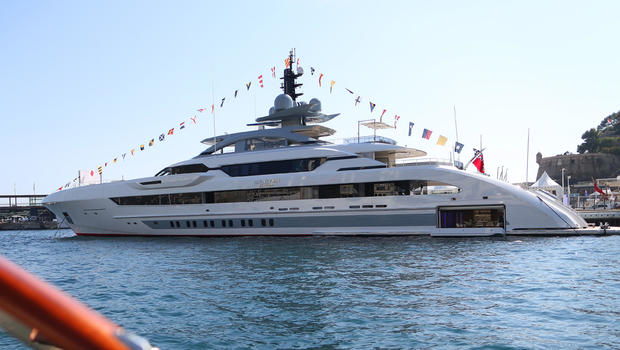
In response to Putin's war against Ukraine, the Biden administration created a task force to go after Russian oligarchs' "yachts, luxury apartments, money and their ability to send their kids to fancy college[s] in the West."
Browder said the goal is to get the oligarchs to pressure Putin to stop the war.
"We're not ready to engage in military warfare. And so there's an expression: We should fight them in the banks if we can't fight them with tanks,'" he said.
Some oligarchs have made statements taking issue with the Russian invasion.
Mikhail Fridman, who founded one of Russia's largest private banks, said he does "not believe that war would be a solution." Evgeny Lebedev — the son of an oligarch, and who owns a London newspaper — wrote an op-ed pleading with Putin to "save the world from annihilation."
The financial pressure is really about undermining support for Putin, both "among rank-and-file Russians as well as the oligarchs who help control the economy," said John Smith, former director of the Treasury Department's Office of Foreign Assets Control, which administers and enforces all foreign sanctions.
Weeks before Russia invaded Ukraine , the $100 million "Graceful" — believed to be owned by Putin himself— left a German port for safer Russian waters.
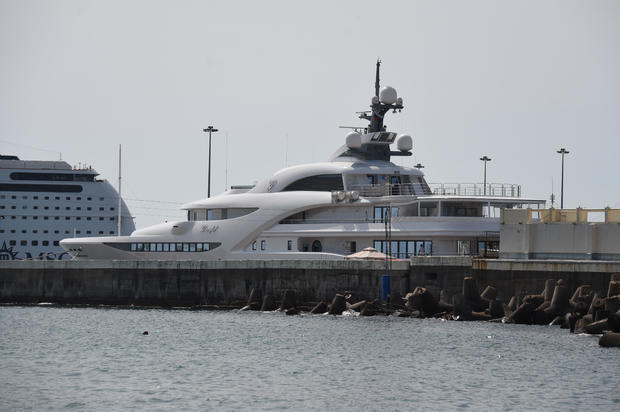
"He's a former KGB agent, and he has worked his entire career to appear on the surface to be the common man — when below the surface, it's apparent that he has significant wealth stored," said Smith.
Former government officials and experts told CBS News that cutting off Putin's revenue from the energy industry is key but this is an area where both the U.S. and its allies are vulnerable. Further disrupting the energy supply could send prices even higher .
- Vladimir Putin

Catherine Herridge is a senior investigative correspondent for CBS News covering national security and intelligence based in Washington, D.C.
More from CBS News
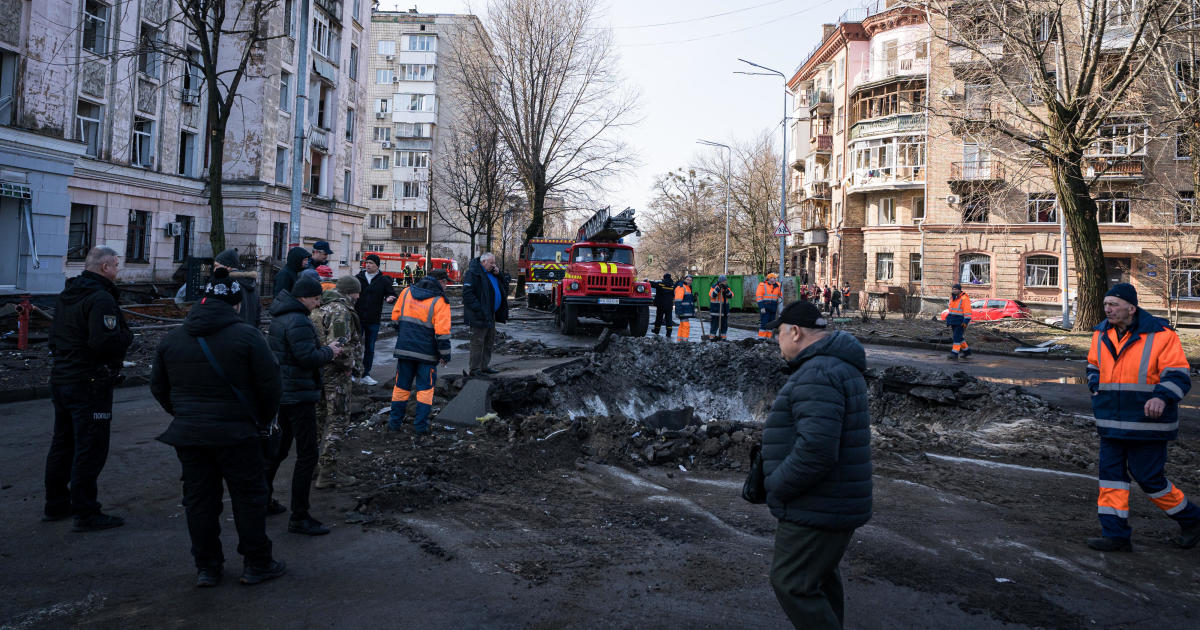
Russia launches huge missile attack on Kyiv for first time in 6 weeks
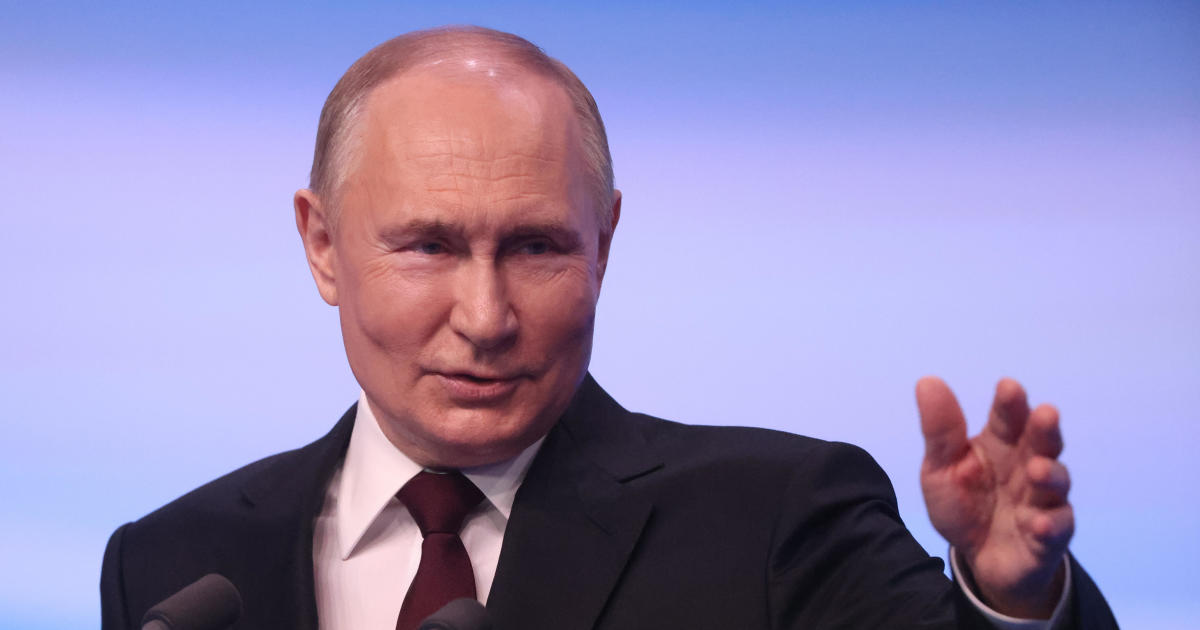
Putin hails election win, but his critics make their presence felt

As Ukraine aid languishes, 15 lawmakers work on end run to approve funds
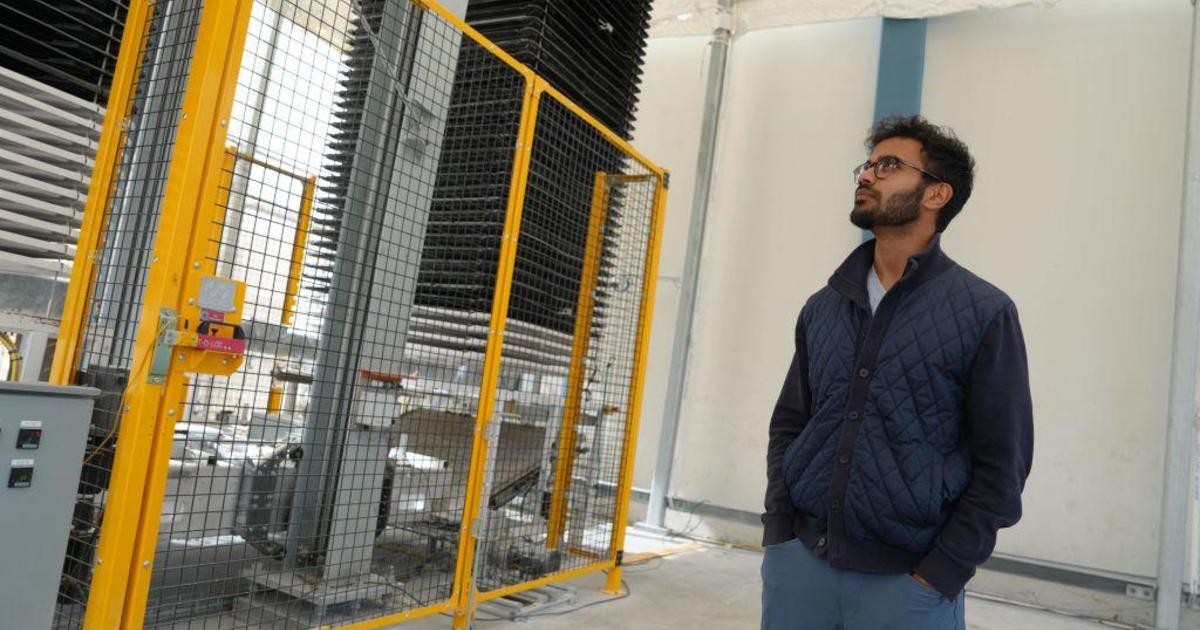
How 2 companies are approaching carbon capture
- International edition
- Australia edition
- Europe edition
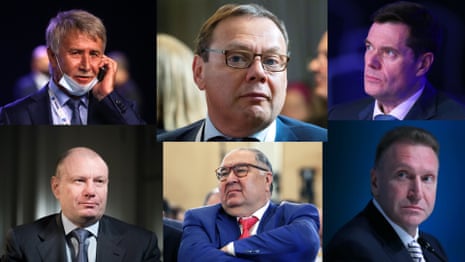
Meet the oligarchs: the Russian billionaires whose jets, yachts and mansions are now in the crosshairs
Some of Russia’s super rich are finding their assets in the west under threat of sanctions from the US
For a growing number of Russia’s richest and most powerful men, now would be a very bad time to take their private jets and superyachts to their mansions in the United States.
Yesterday, the White House announced it would expand the list of Russian oligarchs subject to full blocking sanctions – the highest level of restrictions – as it ramps up punishment against Russia for its invasion of Ukraine. Some of the newly named oligarchs overlapped with a list of Russian elites on whom the European Union imposed sanctions earlier this week, although there were some notable differences.
The federal government won’t just stop at freezing these targets’ assets, but will seize them, Joe Biden announced in his State of the Union address on Tuesday.
In charge of appropriating these assets will be KleptoCapture , a newly announced justice department taskforce, with support from the treasury department, FBI, IRS and other federal agencies. Under US law, the justice department may use civil forfeiture to confiscate the proceeds from foreign crimes, including corruption, when they are found in the United States.

Their efforts will complement those of a transatlantic taskforce announced over the weekend between the United States, France, Germany, Italy, the United Kingdom, Canada and the European Commission.
“We are joining with our European allies to find and seize your yachts, your luxury apartments, your private jets. We are coming for your ill-begotten gains,” Biden said.
The Feds may have their work cut out. US regulations are lax when it comes to requiring disclosures of real estate transactions by foreign individuals, making the country a prime destination for Russian’s uber-rich looking to snap up prime properties without scrutiny.
Other favorite toys of oligarchs like planes and boats are commonly registered through shell companies. And many of those luxury craft have begun traveling toward extradition-free territories such as the Maldives, according to Bloomberg News .
Here’s an introduction to the Russian oligarchs now joining the US sanctions list – as well as a few others who haven’t been targeted yet, but have notable US ties.
Alisher Usmanov
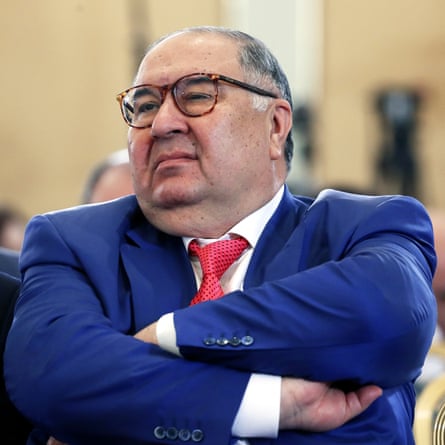
Russians know Alisher Usmanov as one of Vladimir Putin’s “favorite” oligarchs. The country’s richest man until 2015, Usmanov owns a majority stake in Russia’s second-largest phone network, MegFon, and a large stake in the iron and steel giant Metalloinvest.
But few Americans know that Usmanov also helped give us Facebook. The billionaire began investing in the social network in 2009, when Zuckerberg’s firm was having trouble accessing funding in the wake of the financial crisis. Usmanov ultimately poured over $900m into the firm, owning as much as 10% of the company before selling his stake in 2014 and netting himself billions. He was also a major investor in Apple, Twitter, LinkedIn, Groupon and Zynga.
Usmanov was subjected to sanctions by the EU on Monday, and on Wednesday German authorities seized his $600m megayacht , the Dilbar – which boasts the world’s largest yacht-based indoor swimming pool. On 3 March he was among those added to the sanctions list by the US. The oligarch still has a $200m private Airbus A340.
The Rotenbergs
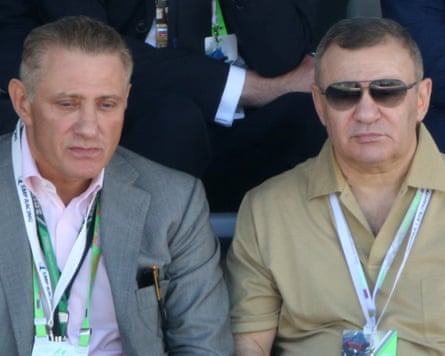
Long before brothers Arkady and Boris Rotenberg became two of Russia’s wealthiest tycoons, they were teenage Vladimir Putin’s judo training buddies, a role they continued into adulthood. Clearly they were good at it, because after Putin became president he rewarded the brothers with the control of large state-owned enterprises and lucrative contracts, netting them a massive fortune.
The Rotenbergs have since built a huge family empire of international investments under a web of shell companies, which has made Arkady’s son Igor a billionaire in his own right. Despite Arkady and Boris getting US sanctions after Russia’s 2014 invasion of Crimea, the brothers “continued actively participating in the US art market by purchasing over $18 million in art in the months following the imposition of sanctions”, according to a US Senate report . Rotenberg-linked shell companies continued making transactions in the US financial system worth over $91m long after the sanctions, according to the report.
In addition to Arkady and Boris, Igor and five additional family members were added to the US sanctions list this week.
Igor Shuvalov
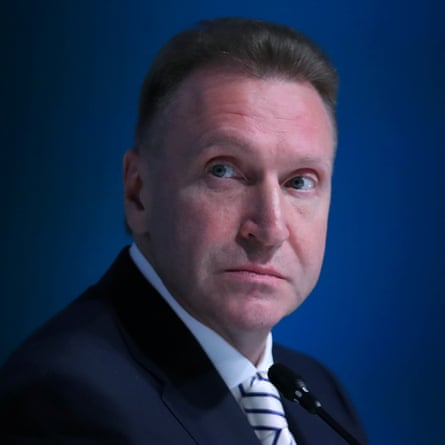
Russia’s deputy prime minister from 2008 to 2018, Igor Shuvalov is now the chairman of VEB, the Russian development bank that finances major infrastructure projects, including the Sochi Olympics. He has claimed to be one of Russia’s cleanest officials, telling media he transferred all his wealth to Russia in 2013, and only kept it offshore before that to avoid spoiling his kids . But an investigation by the anti-corruption activist Alexei Navalny found that Shuvalov, through a shell company, bought two London luxury apartments in 2014 for $11.4m and has used a secret private jet to fly his wife’s corgis around the world because, as one of his staffers explained, “it’s not that comfortable in business class”.
He won’t be able to fly his corgis as many places now that he’s on the US and EU’s sanctions lists.
Yevgeniy Prigozhin
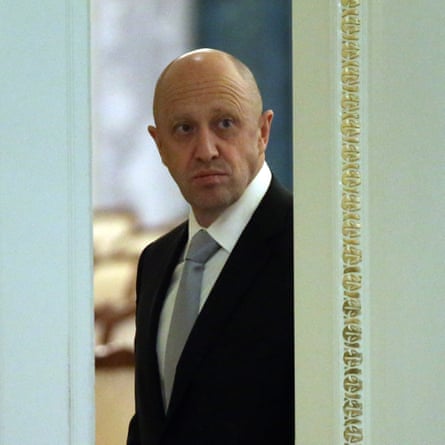
Legend has it Yevgeniy Prigozhin began his rise to power selling hot dogs , shortly after getting released from prison for robbery. The wiener venture was apparently a smash hit, and within years he had opened high-end restaurants that counted Russia’s leader among their clientele, earning him the nickname of “Putin’s chef” and catapulting him into the inner circles of Russia’s elite.
Americans might be more familiar with another one of Prigozhin’s businesses: the Internet Research Agency, which employed a troll army that began by supporting Russia’s 2014 invasion of Crimea, before turning its efforts to influencing the 2016 US presidential election in favor of Donald Trump. Prigozhin and the Internet Research Agency were indicted by a US grand jury in 2018 for interfering with the election, and he was added to an FBI wanted list in 2021.
He’s now on both the US and EU sanctions lists for running disinformation campaigns to support Russia’s invasion of Ukraine.
Sergey Chemezov
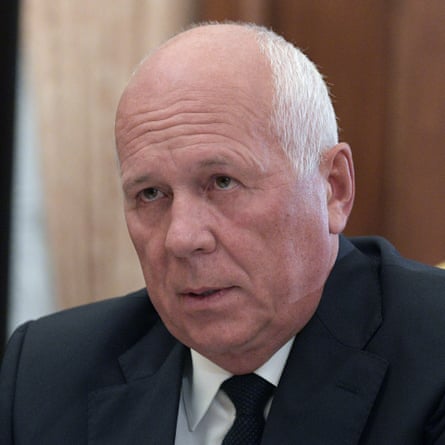
A former KGB officer who befriended Vladimir Putin in the 1980s while living in the same apartment building, Sergey Chemezov rose through Russia’s public and private sector in Putin’s wake, and in 2007 was appointed as CEO of Russia’s state-owned defense giant Rostec, a position he still holds today. Chemezov was sanctioned by the US in 2014 amid Rostec’s role as a supplier for Russia’s invasion of Crimea, and Washington is targeting him again, now with his family members.
According to investigative reports and allegations from the jailed activist Alexei Navalny, Chemezov’s relatives have used shell companies to accumulate eye-watering assets , including superyachts and luxury villas around the world. But Chemezov says he’s clean, telling Russian media in 2019: “I do not accumulate wealth. I don’t stuff money in the corners. I don’t have yachts or airplanes.”
Nikolai Tokarev
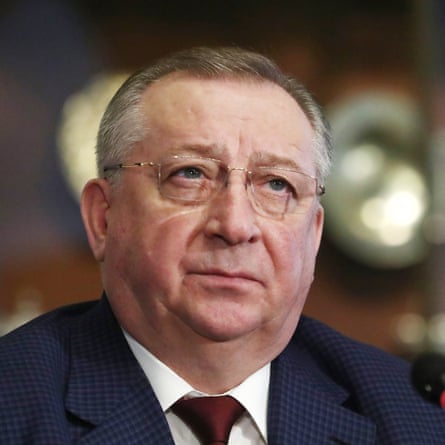
Another former KGB officer who served alongside Putin and Chemezov, Nikolai Tokarev took over former Soviet state assets as Putin built his political power, and in 2007 became the head of the state-controlled oil giant Transneft. The oligarch has used his position at Transneft to build a business and real estate empire, which reportedly includes sponsoring an extremely fancy palace that’s said to be personally used by Putin. Tokarev was hit by US and EU sanctions this week.
Vladimir Potanin
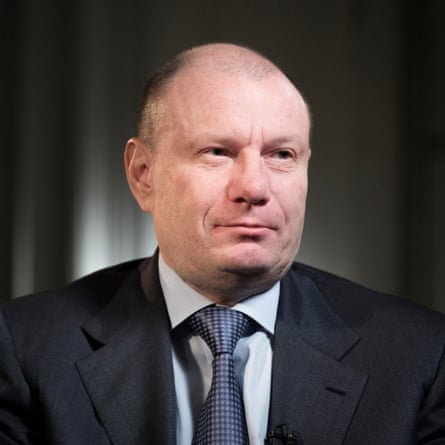
Reportedly the second richest man in Russia, the banker, metals mining tycoon and former deputy prime minister Vladimir Potanin was among a small circle of oligarchs who met with Putin last week as the invasion of Ukraine began.
Potanin has played a big role in American arts: he has been a board member of New York’s Guggenheim Museum for two decades, until he stepped down on Wednesday. He has also given millions to the Kennedy Center in Washington, which carved his name into a wall. He is also known to have owned property in New York City , which came to light during a divorce fight that could cost him $7bn.
Potanin isn’t currently under US sanctions, which is good news for his three megayachts and two private jets (that we know about).
Leonid Mikhelson
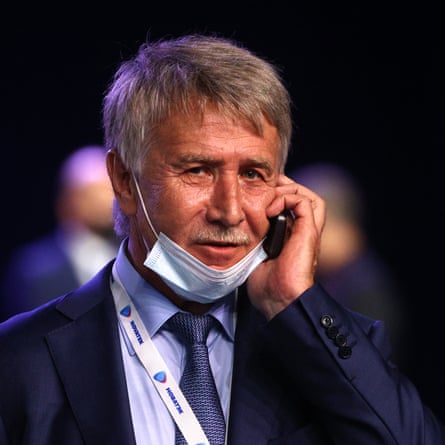
Russia’s richest man in 2016, Leonid Mikhelson is the founder and chairman of natural gas producer Novatek, a close friend of Putin’s, and a business partner of Gennady Timchenko, a billionaire who has been under US sanctions since 2014.
Mikhelson loves art: along with his $200m art collection, he was on the board of trustees at New York’s New Museum from 2013 to 2017, and has sponsored exhibitions at the Art Institute of Chicago and London’s Tate Modern. His ostentatious superyacht, the Pacific, can reportedly accommodate two helicopters.
But his other assets may be harder to trace. In 2017, the Panama Papers revealed that Mikhelson had used an intricate system of shell companies to secretly register a $65m Gulfstream private jet in the United States, which in most cases requires US citizenship or permanent residency.
The tycoon is not currently subject to sanctions, though his company Novatek is.
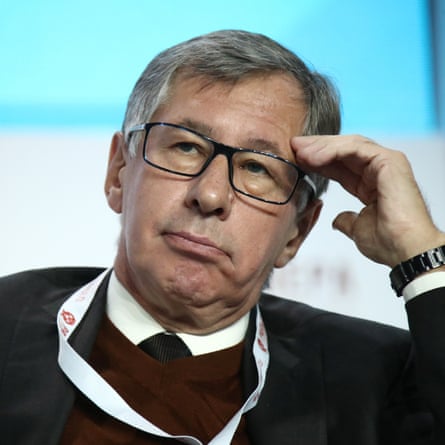
Petr Aven is the head of Alfa Group, a commercial bank subject to US sanctions that helped him amass an estimated $5.5bn fortune. A well-known collector of classical Russian paintings, Aven has lent works from his collection – reportedly worth $200m – to New York’s Museum of Modern Art and the Neue Galerie. Aven reportedly has never bought a plane or yacht, and told the FT “all my money goes in to art.” That is, of course, if you don’t count the millions he spent transforming an 8.5-acre plot in England into a “KGB-proof” mansion , complete with a bomb-proof panic room.
Last year, Aven filed a libel lawsuit against HarperCollins for a book it published about Vladimir Putin’s rise, Putin’s People.
Aven was sanctioned on Monday by the EU, which described him as “one of Vladimir Putin’s closest oligarchs” and one of “approximately 50 wealthy Russian businessmen who regularly meet with Vladimir Putin in the Kremlin”. He has not yet been placed under sanctions by the US or UK.
Mikhail Fridman
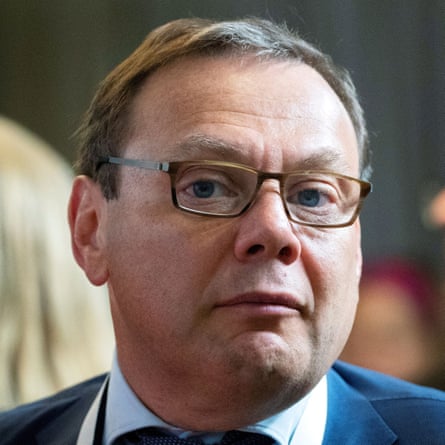
Petr Aven’s business partner, Mikhail Fridman, is Alfa Group’s founder and a Ukrainian-born Russian oligarch. Fridman has made substantial investments in the United States, which include spending a reported $1bn in 2011 to buy up distressed properties across the east coast, telling the Wall Street Journal at the time, “The American market is the most well-regulated and liquid market in the world. It has the best protection for investor rights.”
Through Fridman’s investment group, LetterOne, the billionaire also sank $200m into Uber , and $50m into the telecom startup FreedomPop. Fridman also caused a stir in 2018 when he spoke alongside Aven at a closed-door dinner hosted by the Atlantic Council, a major US foreign policy thinktank, in what critics saw as an unofficial Kremlin mission to protest against US sanctions.
Last week, Fridman became one of the first oligarchs to speak out against the invasion of Ukraine, calling it a “tragedy” and writing that “war can never be the answer.” Nonetheless, Fridman was subjected to sanctions on Monday by the EU, which named him as “a top Russian financier and enabler of Putin’s inner circle”. Like Aven, he has not yet been placed under sanctions by the US or UK.
The oligarch has a son, Alexander, who is reportedly attending NYU’s Stern business school, after a stint in Moscow selling hookah .
Alexei Mordashov
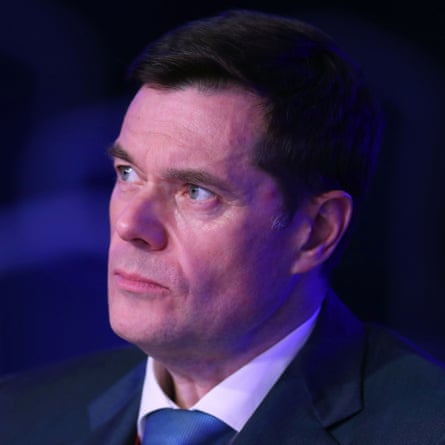
Currently Russia’s richest man, Alexei Mordashov owns a third of Tui, Europe’s biggest tourism firm, and gained his billions as the chief executive of Russia’s largest steel and mining firm, Severstal. He is also a large shareholder of the Bank of Rossiya, which has opened up branches across Russia-occupied Ukrainian territory in recent years.
Over the last two decades, the billionaire has also poured money into the United States, investing heavily through Severstal in steel companies in the midwest before selling them for $2.3bn in 2014.
Mordashov has been hit with sanctions by the EU, but the US hasn’t taken action yet. They would be interested in his Bombardier Global 6000 private jet and multiple superyachts, including the $500m Nord, which Senator Bernie Sanders noted on Tuesday had been “sailing in the Seychelles region for more than 10 days” in a Twitter thread about Russian offshore wealth.
Roman Abramovich
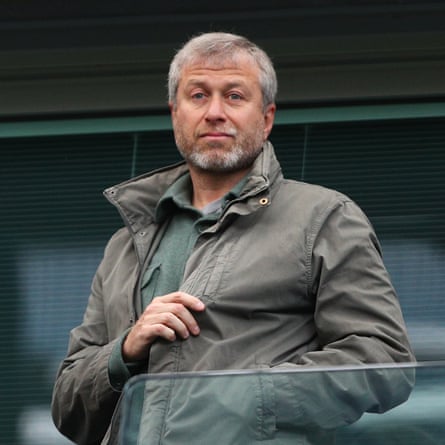
Roman Abramovich, the longtime owner of Chelsea FC, has been described by a member of the UK parliament as a “ key enabler ” of Putin’s regime, which Abramovich has long denied. An orphan raised by his grandparents in Siberia, Abramovich pulled himself up by his bootstraps the old-fashioned way: wriggling into the inner circles of government and then profiting hugely by selling previously state-owned assets that he acquired after the fall of the Soviet Union.
The billionaire owns one of the world’s most outlandish yachts, complete with an onboard submarine and three helicopters. He has also owned a number of ultra-expensive properties in the United States, including a trio of buildings in New York City’s Upper East Side worth more than $90m combined, which he transferred to his third wife, Darya Zhukova, in 2018.
Abramovich is not currently under western sanctions. Earlier, the British prime minister, Boris Johnson, told the House of Commons that Abramovich was “already facing sanctions” though later said he “misspoke”.
This article was amended on 7 March 2022 to clarify that Leonid Mikhelson was on the New Museum’s board from from 2013 to 2017
Most viewed
Who's Paying for Russian Oligarch's Seized Yacht in San Diego Bay?
The amadea, which superyachttimes.com called the 63rd largest yacht in the world, tied up monday at naval base san diego, in national city, by eric s. page and mari payton • published june 28, 2022 • updated on june 28, 2022 at 2:11 pm.
Many San Diegans who saw the news about the Amadea — the $325 million seized Russian oligarch's yacht that docked in San Diego on Monday — may be wondering: Who's paying for that?
Imagine how much the fuel costs to sail it more than 5,000 miles from Fiji, where it was seized earlier this month, to San Diego? A local marine fuel dock quoted the following prices, if you're wondering: $7.40 for gas, $7.35 for diesel. According to SuperYachtTimes.com, the Amadea has a 392,000-liter fuel tank. That works out to about 103,555 gallons, so it could cost $766,307 or so just to fill up.
And then there are maintence costs on a 350-foot long yacht, which, you can be sure, are extensive and necessary — in fact, not undertaking such efforts can cause the vessel's value to decline if it deteriotes due to neglect.
Get San Diego local news, weather forecasts, sports and lifestyle stories to your inbox. Sign up for NBC San Diego newsletters.
The Amadea carries a full complement of 36 crew, including the captain, according to SuperYachtTimes, but it won't need nearly that many once she tied up at Naval Base San Diego in National City. Nevertheless, someone will be monitoring the yacht and conducting the maintenance.
According to the U.S. Department of Justice, the yacht was bought with what it calls "dirty money," and, as such, some may be relieved to hear, will be sold to the highest bidder. Presumably, the associated post-seizure costs accrued after its seizure will be coming off the top of the sale price. Until then, the Amadea, which SuperYachtTimes called the 63rd larges yacht in the world, will resume in the custody of the U.S.

‘The Wall That Heals' memorial to honor Vietnam War veterans arrives in El Cajon

Balboa Theatre celebrates 100th anniversary with $3.50 performances
Officials with the DOJ said the Amadea, which was seized in connection to the department's KleptoCapture campaign undertaken in the wake of the invasion of Ukraine by Russia, was owned by Suleiman Kerimov a Russian billionaire.
After the yacht arrived in San Diego, John Kirby, a former federal prosecutor, told NBC 7 that he thinks the U.S. government hopes moves like the Amadea's seizure are efforts to apply pressure to Russian president Vladimir Putin.
Earlier this month, Deputy U.S. Attorney General Lisa O. Monaco said, regarding the Amadea, “The department had its eyes on every yacht purchased with dirty money. This yacht seizure should tell every corrupt Russian oligarch that they cannot hide — not even in the remotest part of the world. We will use every means of enforcing the sanctions imposed in response to Russia’s unprovoked and unjustified war in Ukraine.”
The court ruling represented a significant victory for the U.S. as it encounters obstacles in its attempts to seize the assets of Russian oligarchs around the world. While those efforts are welcomed by many who oppose the war in Ukraine, some actions have tested the limits of American jurisdiction abroad.
The United States wasted no time in taking command of the after a Fiji court ruled in its favor and sailed the ship away from the South Pacific nation just hours after the ruling.
"If you could say or somehow prove that this boat … that the oligarch had the money for this boat because he bribed Vladimir Putin, that is public corruption," Kirby said. "It’s a crime even when it takes place outside the United States. The United States can still act upon it."
According the website, the Amadea is not currently for sale, but that may soon change. Until then, you can "shop" for other eye-popping, wallet-busting boats here .
The Associated Press contributed to this report — Ed.
This article tagged under:
Money Report

Russian oligarch's yacht is costing US taxpayers close to $1 million a month
By robert frank,cnbc • published march 6, 2024 • updated on march 6, 2024 at 11:26 pm.
A mega-yacht seized by U.S. authorities from a Russian oligarch is costing the government nearly $1 million a month to maintain, according to new court filings.
- The Justice Department is seeking permission to sell Amadea, which it seized in 2022, alleging that it was owned by sanctioned Russian billionaire Suleiman Kerimov.
- Attorneys for Eduard Khudainatov, an ex-Rosneft CEO who has not been sanctioned, say he owns the yacht, and have sought to take back possession of the vessel.
The U.S. Department of Justice is seeking permission to sell a 348-foot yacht called Amadea, which it seized in 2022, alleging that it was owned by sanctioned Russian billionaire Suleiman Kerimov. The government said it wants to sell the $230 million yacht due to the "excessive costs" of maintenance and crew, which it said could total $922,000 a month.
Get Tri-state area news and weather forecasts to your inbox. Sign up for NBC New York newsletters.
"It is excessive for taxpayers to pay nearly a million dollars per month to maintain the Amadea when these expenses could be reduced to zero through [a] sale," according to a court filing by U.S. prosecutors on Friday.
The monthly charges for Amadea, which is now docked in San Diego, California, include $600,000 per month in running costs: $360,000 for the crew; $75,000 for fuel; and $165,000 for maintenance, waste removal, food and other expenses. They also include $144,000 in monthly pro-rata insurance costs and special charges including dry-docking fees, at $178,000, bringing the total to $922,000, according to the filings.
Sign up to receive future editions of CNBC's Inside Wealth newsletter with Robert Frank.

Microsoft debuts first Surface PCs with dedicated Copilot chatbot key
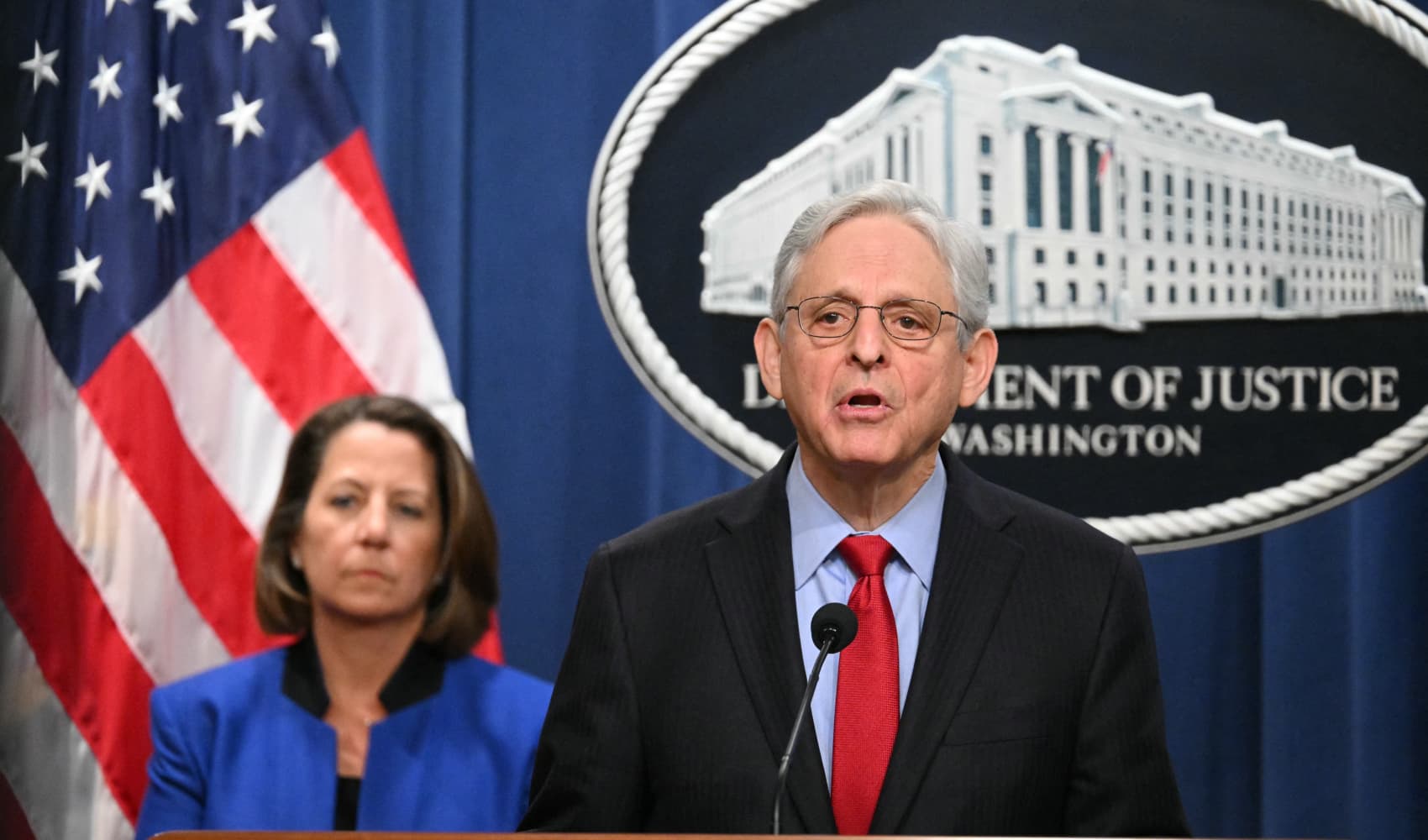
Watch: U.S. Attorney General Merrick Garland speaks on DOJ's antitrust suit against Apple
The battle over Amadea and the costs to the government highlight the financial and legal challenges of seizing and selling assets owned by Russian oligarchs after the country's invasion of Ukraine. European Commission President Ursula von der Leyen said last week that the European Union should use profits from more than $200 billion of frozen Russian assets to fund Ukraine's war effort.
Her comments echoed government calls in the spring of 2022 to freeze the yachts, private jets and mansions of Russian billionaires in hopes of putting pressure on Russian President Vladimir Putin and raising money for the war effort.
Yet, nearly two years later, the legal process for proving ownership of the Russian assets and selling them has proven to be far more time-consuming and costly. In London, Russian billionaire Eugene Shvidler has waged a court battle over his private jets that were impounded, and Sergei Naumenko has been appealing the detention of his superyacht Phi.
The battle over Amadea began in April 2022, when it was seized in Fiji at the request of the U.S. government, according to the court filings.
Though the U.S. alleges that the yacht is owned by Kerimov, who made his fortune in mining, attorneys for Eduard Khudainatov, an ex-Rosneft CEO who has not been sanctioned, say he owns the yacht, and have sought to take back possession of the vessel.
In court filings, Khudainatov's attorneys have objected to the U.S. government's efforts to sell the yacht, saying a rushed sale could lead to a distressed sale price and that the maintenance costs are minor relative to the potential sale value.
Khudainatov's attorneys refuse to pay the ongoing maintenance costs as long as the government pursues a sale and forfeiture. However, they say their client will reimburse the U.S. government for the more than $20 million already spent to maintain the yacht if it's returned to its proper owner.
In court papers, the government says Kerimov disguised his ownership of Amadea through a series of shell companies and other owners. They say emails between crew members show Kerimov "was the beneficial owner of the yacht, irrespective of the titleholder of the vessel."
The emails show that Kerimov and his family ordered several interior improvements of the yacht, including a new pizza oven and spa, and that between 2021 and 2022, when the boat was seized, "there were no guest trips on the Amadea that did not include either Kerimov or his family members," according to the court filings.
The government also says Kerimov has been trying to sell Amadea for years, so a sale would be in keeping with his intent.
"This is not a situation in which a court would be ordering sale of a precious heirloom that a claimant desperately wishes to keep for sentimental reasons," the government said in filings.
Even if Amadea were sold quickly, the proceeds wouldn't automatically go to the government. Under law, the money would be held while Khudainatov and the government continue their battle in court over the ownership and forfeiture. Don't miss these stories from CNBC PRO:
- Instead of chasing Nvidia, investor buys these misunderstood, cheap growth stocks for big returns
- Why Warren Buffett thinks the power of compound interest is the key to his success
- Forget cash — it's time to move into fixed income, Franklin Templeton strategist says
- Dan Niles reveals why he prefers the 'Fantastic Four' and when the 'AI bubble' might pop
- Investors should tread carefully in March after bitcoin's explosive rally to $60,000
Also on CNBC
- Here's how self-made millionaire Vivian Tu created wealth
- Here are the most powerful passports for 2024 — Switzerland tops the list
- Many women are looking for 'financial peace,' expert says. How they can achieve it

This article tagged under:
Why the U.S. put a $1 million bounty on a Russian yacht’s alleged manager
On Sept. 3, 2020, the staff of a $90 million yacht placed an order with a U.S. company for a set of luxury bathrobes that came to $2,624.35.
For roughly two years before that, according to federal prosecutors, the yacht’s management had been falsely claiming it was working for a boat named “Fanta.” But the luxury bathrobes came embroidered with a monogram that, prosecutors said, revealed the yacht’s true identity: “Tango.”
That was a problem, officials say in court papers, because Tango was owned by a Russian billionaire under U.S. sanctions, and doing business on his behalf violated federal law.
Late last month, U.S. authorities unveiled a $1 million reward for information leading to the arrest and or conviction of the man they say was running the yacht staff and orchestrated the deception with the robes — Vladislav Osipov, 52, a Swiss-based businessman from Russia. In a new indictment , federal prosecutors say Osipov misled U.S. banks and companies into doing business with the Tango yacht despite the sanctions on the Russian owner, whom the Justice Department has identified as billionaire Viktor Vekselberg .
Osipov has denied the allegations. Osipov’s attorney has said that the government has failed to demonstrate that Vekselberg owned the yacht, and that its management was therefore not a sanctions violation.
The reward offer for Osipov reflects the latest stage in the evolution of the West’s broader financial war against Russia two years into the war in Ukraine, as the United States and its allies increasingly target intermediaries accused of enabling Russian oligarchs to circumvent sanctions.
Many Russians close to President Vladimir Putin have been under sanctions dating to 2014, when Russia seized Crimea from Ukraine and sent proxy forces into that country’s eastern Donbas region. When Russia invaded Ukraine in 2022, President Biden vowed to deal a “crushing blow” with a barrage of new sanctions on financial institutions, industries, business executives and others tied to the Kremlin. But roughly two years later, Russia’s economy has proved surprisingly resilient after the nation poured tens of billions of dollars into ramping up its military industry. Moscow has also worked around the sanctions, finding new third parties to supply it with critical military and industrial hardware, as well as countries beyond Europe to buy its oil.
Now, the West is trying to increase the reach of its sanctions by digging deeper into Russian supply chains. Late last month, the Treasury Department announced more than 500 new sanctions targeting Russia , primarily on military and industrial suppliers. The Justice Department also announced charges against two U.S.-based “facilitators” of a Russian state banker who is under sanction, as well as the guilty plea of a dual national based in Atlanta who was accused of laundering $150 million through bank accounts and shell companies on behalf of Russian clients.
Prioritizing criminal charges against — and the arrests of — Western employees of Russia’s elites represents a new escalation of the U.S. financial war against Putin, experts say. One Moscow businessman, speaking on the condition of anonymity for fear of retribution, said many influential Russians are concerned about the arrest of two associates of Andrey Kostin, the head of VTB, Russia’s second-biggest state bank. These associates, Vadim Wolfson and Gannon Bond, were charged with helping Kostin evade sanctions by maintaining a $12 million property in Aspen, Colo., for Kostin’s benefit while concealing his ownership. Kostin has said that the charges of sanctions evasion against him are “unfounded” and that he has not violated any laws . Bond has pleaded not guilty; Wolfson hasn’t made an initial court appearance yet.
Wolfson, also known as Vadim Belyaev, had been a Russian billionaire until the Russian government took over his bank in 2017. Bond, 49, is a U.S. citizen from Edgewater, N.J. For all Russians living abroad and working with people in Russia, the threat of criminal charges is a much more worrying prospect than the sanctions imposed by the Treasury Department last month against hundreds of individuals and entities, the businessman said, in part because sanctions are far easier to dodge than criminal charges.
“What you have seen through today’s public announcements are our efforts at really targeting the facilitators who possess the requisite skill set, access, connections that allow the Russian war machine [and] the Russian elites to continually have access to Western services and Western goods,” David Lim, co-director of the Justice Department’s KleptoCapture task force, which is tasked with enforcing U.S. sanctions over Russia’s invasion of Ukraine, told reporters last month.
Thad McBride, an international trade partner at the law firm Bass Berry & Sims, said the crackdown on intermediaries reflected the natural evolution of the U.S. sanctions campaign in response to Russian adjustments.
“It seems to me they have gone through a comprehensive list of the oligarchs, and you can debate whether or not it’s had a meaningful impact on the Russian war effort,” McBride said. “Because they’re getting smarter about who’s who, they’re finding other people who play meaningful roles in these transactions, even though they’re not showing up in the headlines.”
The charges against Osipov related to his alleged management of the Tango yacht illustrate the mounting potential consequences for people in Europe and the United States who attempt to do business with Russians targeted by Western allies, as well as the opaque structures allegedly employed by those seeking to evade sanctions.
With a net worth estimated by Forbes in 2021 at $9 billion, Vekselberg, 66, has long drawn scrutiny from the West — and sought to safeguard his wealth. He made his initial fortune in aluminum and oil in Russia’s privatization of the 1990s and then expanded into industrial and financial assets in Europe, the United States and Africa, with Putin’s blessing. In addition to the yacht, federal prosecutors say, Vekselberg acquired $75 million worth of properties, including apartments on New York’s Park Avenue and an estate in the Long Island town of Southampton.
Vekselberg, who declined to comment for this article, has not been criminally charged by the Justice Department. In a 2019 interview with the Financial Times, he denounced the sanctions as arbitrary and harmful for international business, saying he had been targeted just because he was Russian and rich and knows Putin.
In April 2018, the Treasury Department under the Trump administration sanctioned Vekselberg and six other Russian oligarchs as part of broader financial penalties over the Kremlin’s invasion of Crimea, support for President Bashar al-Assad in Syria and interference in the 2016 U.S. presidential election. Vekselberg was also targeted for his work for the Kremlin as chairman of the Skolkovo Foundation, an attempt to create Russia’s version of the Silicon Valley — evidence that appeared to undermine the Russian businessman’s claims that he operated independently of the Kremlin.
But with Vekselberg’s payments monitored by U.S. banks, according to the federal indictment , Osipov used shell companies and intermediaries to avert the bite of sanctions. Vekselberg kept other major assets out of the reach of U.S. authorities by making use of the Treasury Department’s 50 percent ownership rule, which stipulates that it is illegal to transact with firms only if an owner under sanction controls more than 50 percent of the business.
For example, a month after Treasury imposed sanctions on Vekselberg in April 2018, his Renova Innovation Technologies sold its 48.5 percent stake in Swiss engineering giant Sulzer to Tiwel Holding AG, a group that is nevertheless still “beneficially owned” — meaning, owned in practice — by Vekselberg through Columbus Trust, a Cayman Islands trust, according to Sulzer’s corporate filing. Vekselberg’s longtime right-hand man at Renova, Alexei Moskov, replaced one of Vekselberg’s direct representatives on the board. Moskov told The Washington Post that he stepped down from all his executive positions at Renova Group in 2018 after U.S. sanctions were first imposed and from that moment ceased to be Vekselberg’s employee.
The attempts to circumvent the sanctions appear to have found some success in the U.S. legal system. Columbus Nova, a U.S.-based asset management fund controlling more than $100 million in assets in the U.S. financial and tech industry, is run by Vekselberg’s cousin, Andrew Intrater. The firm battled for more than two years to lift a freeze on Columbus Nova’s assets, imposed by Treasury’s Office of Foreign Assets Control because of the sanctions on Vekselberg, and won, reaching a settlement agreement with the Treasury Department. After renaming itself Sparrow Capital LLC, Columbus Nova successfully argued that Intrater — not Vekselberg — owns the fund. Intrater argued that the company was 100 percent owned by U.S. citizens and that no individual or entity under sanction held any interest in it. Intrater said Columbus Nova had earned fees for managing investment funds owned by Renova. He said he had repeatedly told Treasury he would not distribute any funds to Vekselberg.
Now Osipov, the alleged manager of Vekselberg’s $90 million yacht, is attempting a similar argument as U.S. authorities seek his arrest on charges of bank fraud, money laundering, conspiracy to defraud the United States, and violations of sanctions law.
The federal indictment states that the Tango was owned by a shell corporation registered in the British Virgin Islands that was in turn owned by several other companies. The Virgin Islands shell company, authorities say, was controlled by Osipov, who also served in senior roles for multiple companies controlled by Vekselberg. U.S. officials also say Vekselberg ultimately controlled the other companies that owned the Virgin Islands shell company.
According to the indictment, a Tango official instructed a boat management company in Palma de Mallorca, Spain, to use a false name for the yacht — “Fanta” — to disguise its true identity from U.S. financial institutions and firms, which try to avoid doing business with an entity or person under sanction.
Working at Osipov’s direction, according to the indictment, employees for Tango bought more than $8,000 worth of goods for the yacht that were unwittingly but illegally processed by U.S. firms and U.S. financial institutions, including navigation software, leather basket magazine holders provided by a bespoke silversmith, and web and computing services. The management company running Tango, run by Osipov, also paid invoices worth more than $180,000 to a U.S. internet service provider, federal prosecutors say.
The Tango was seized by the FBI and Spanish authorities in the Mediterranean not long after Russia invaded Ukraine in 2022, and Osipov was first indicted last year. The owner of the Spanish yacht management company hired by Osipov, Richard Masters, 52, of Britain, was criminally charged last year by federal prosecutors with conspiracy to defraud the United States and violating federal sanctions law. A request for comment sent to Masters’ firm was not returned.
But in recent court documents, Osipov’s attorney argues that the yacht was not more than 50 percent owned by Vekselberg, and that the government hasn’t demonstrated it was. Barry J. Pollack, an attorney at Harris, St. Laurent and Wechsler, also says the government never warned Osipov of its novel and “unconstitutional” application of federal sanctions law.
“The government points to no precedent that supports its extraordinary interpretation and cites no authority that allows the traditional rules of statutory construction to be turned on their head,” Pollack wrote in a defense filing. The filing adds: “[Osipov] is not a fugitive because he did not engage in any of the allegedly criminal conduct while in the United States, has never resided in the United States, did not flee from the United States, and has not concealed himself.”
Still, the State Department’s Transnational Organized Crime Rewards Program has said it will provide up to $1 million for information leading to Osipov’s arrest, warning that he may visit Herrliberg, Switzerland; Majorca, Spain; or Moscow.
The case demonstrates the extent of the U.S. commitment to tighten the screws on those seen as aiding Russian elites, even if they themselves are not closely tied to the Kremlin.
“When DOJ levels legal action against an individual or entity, they have quite a bit of evidence, especially because the threshold to press charges for money-laundering and sanctions evasion is so high,” said Kim Donovan, director of the Economic Statecraft Initiative within the Atlantic Council’s GeoEconomics Center. “We’ve had quite a bit of experience targeting Russia directly, and what you’re starting to see is the U.S. go after the facilitators enabling sanctions evasion. That’s where the U.S. is focusing its efforts right now.”

World News | Roman Abramovich’s jet-set ex-wife, friend of…
Share this:.
- Click to share on Facebook (Opens in new window)
- Click to share on Twitter (Opens in new window)
- Click to print (Opens in new window)
- Click to email a link to a friend (Opens in new window)
- Click to share on Reddit (Opens in new window)
Today's e-Edition
- Latest News
- Environment
- Transportation
Breaking News
World news | apple sued in a landmark iphone monopoly lawsuit, subscriber only, world news | roman abramovich’s jet-set ex-wife, friend of ivanka trump and karlie kloss, in the hot seat, about a week before russia’s invasion, dasha zhukova partied with karlie kloss. she now faces scrutiny for $96 million in new york property transferred to her by her oligarch ex-husband.

Even before the U.K. issued sanctions against Russian oligarch Roman Abramovich Thursday, he was on the figurative run, trying to sell off his Chelsea Football Club and his 15-bedroom mansion near Kensington Palace, and reportedly sending his Boeing jet and two mega-yachts to places where they can’t be seized.
Unfortunately for Abramovich’s jet-set ex-wife, Dasha Zhukova, Russia’s invasion of Ukraine has also put her in the hot seat — even as she has long enjoyed friendships with Ivanka Trump, Karlie Kloss and other powerful people in elite circles in art, fashion, Hollywood and high society.

The Russian-born art collector, who reportedly attended Donald Trump’s inauguration at Ivanka’s invitation, has repeatedly had to answer questions about the $92 million in New York City property that Abramovich transferred to her in 2018. She’s also tried hard to distance herself from her ex-husband, who’s worth about $12 billion, enjoys close ties to Vladimir Putin and has been listed as one of Putin’s chief “enablers” by Alexei Navalny.
“As Russia has become an international pariah, it’s meant a huge shift of fortune for Zhukova,” a new Vanity Fair report said Thursday.
Just a week before the invasion, Zhukova was seen enjoying an “intimate dinner” with her good friends Kloss and Wendi Deng, the ex-wife of Rupert Murdoch, at “a Greenwich Village hotspot” during New York Fashion Week, Vogue reported.
But several days after Russia’s invasion, Zhukova, 40, had to issue a statement to the New York Post for a story it published about oligarchs’ real estate holdings in Manhattan and the Upper East Side property Abramovich transferred to her. The holdings consist of a set of historic townhouses that Abramovich had begun combining into a single mega-mansion that was once derided as “a whole new level of egregious consumption.”

Zhukova, who shares two children with Abramovich, told the New York Post and other outlets that the transfer was part of their divorce settlement. She also condemned the “brutal and horrific invasion,” telling the New York Post: “As someone born in Russia, I unequivocally condemn these acts of war, and I stand in solidarity with the Ukrainian people as well as with the millions of Russians who feel the same way.”
A representative for Zhukova also issued a statement to the New York Times for its report on how Abramovich’s “billions and his Kremlin connections secured him favors and elite status in the West.” The statement insisted that “Dasha has moved on with her life and is happily remarried.”
But Putin’s attack on a democratic neighbor has created uncertainty for Zhukova’s main achievement as an art-world luminary, Vanity Fair reported. The Garage Museum of Contemporary Art in Moscow, the gleaming institution Zhukova and Abramovich co-founded in 2008, announced that it would halt work on exhibitions “until the human and political tragedy that is unfolding in Ukraine has ceased.”
Such statements from Zhukova and her museum may not alleviate concerns that she, like other relatives of Russia’s oligarchs, have enjoyed lavish lifestyles made possible by Putin’s associates, who used their connections to him to “pillage the Russian state” and enrich themselves and their families, as the U.S. Treasury Department has said.
The Post said Zhukova declined to comment on whether or not she agrees that family members of sanctioned oligarchs should also “be deprived of illicit wealth and its accouterments — property, yachts, art, jets and jewels — obtained and retained thanks to direct ties to dirty deals and dictators.”
Another issue with Zhukova is that Abramovich isn’t the first oligarch in her life. Her father is oil tycoon Alexander Zhukov, according to Elle and Vanity Fair. Zhukova’s parents divorced when she was young; she grew up in California with her molecular biologist mother, Yelena, and attended UC Santa Barbara.

But even with her mostly American upbringing, Zhukova still comes “from a family that’s tied up in the explosion of wealth created by the demise of the Soviet Union and a free market economy (shaped by) brute force and cronyism,” Vanity Fair said.
When Zhukova was young, she “spent her time floating around prestigious American universities and cruising on the yachts of the high society,” Elle reported. She also didn’t know much about art, but that apparently changed around the time she met Abramovich on one of those yachts, Elle added.
By 2008, she had become famous, known as “an art-world It Girl” because of her “billionaire, art-collecting boyfriend,” the New York Times reported at the time.
As Abramovich’s “muse,” Zhukova likely helped him spend hundreds of millions of dollars to buy iconic art works by Edvard Munch, Lucian Freud, Francis Bacon and others. While she was with Abramovich, Zhukova also landed prestigious appointments to the boards of the Los Angeles County Museum of Art, and the Metropolitan Museum of Art in New York.
Indeed, in a 2009 report about LACMA’s appointment of Zhukova, Time magazine speculated that her main contribution to the museum would be to help it gain “a pipeline” to Abramovich and his “zillionaire” wealth.
But the way the couple went about buying art struck one New York art world figure as “a trophy approach to collecting,” the New York Times said. Abramovich and Zhukova also ruffled feathers in New York in 2013 when he docked his $500 million, 533-foot yacht Eclipse on the Hudson River, with Zhukova giving birth to their daughter, Leah Lou, at a local hospital several months later, Forbes reported. While there were jokes about Leah being an “anchor baby,” she would have had citizenship in any case because Zhukova has a U.S. passport, Forbes said.
A few years later, Abramovich’s extravagance irked the Historic Districts Council, a New York advocacy group, because of his plans to combine three of four of his townhouses on East 75th street into what was called an “urban castle.” Its 19,000 square feet would include an elevator, a pool, a new glass-and-bronze rear facade and an “art room.”
Meanwhile, if anyone’s interested in the MASSIVE single-family home #RomanAbramovich is building on #NYC ’s UES, well, here’s his 4-homes-into-1 monstrosity. Will be the largest apartment in NYC; #JeffreyEpstein just rolled over in hell 🔥🔥 #russia #oligarch pic.twitter.com/gX5fWMELRR — NYC Sights Sounds (@NYCSightsSounds) February 24, 2022
Abramovich’s art-world philanthropy and efforts to make VIP friends in the West may have been ways he tried to “launder his reputation in the West,” according to Thomas Graham, a Russia scholar at the Council on Foreign Relations, interviewed by the New York Times. But Abramovich’s extravagance no doubt contributed to Zhukova’s celebrity.
Zhukova’s VIP friends came to include Ivanka Trump and her husband Jared Kushner; and Josh Kushner, Jared’s brother, and Josh’s model wife, Karlie Kloss. In Feb. 2014, a month before Putin illegally annexed Crimea from Ukraine, Ivanka Trump posted a photo to Instagram of herself with Zhukova and their pal Wendi Deng, Politico reported in 2017 . The photo showed the friends with a bottle of wine and was accompanied by the caption: “Thank you [Zhukova] for an unforgettable four days in Russia!”
Over the past decade, coverage of the Met Gala and other society events, as well as Zhukova’s yacht vacations, showed her socializing with Deng, Anna Wintour, Gwen Stefani, David Geffen, Kate Hudson, Demi Moore, Charlotte Casiraghi, Stella McCartney, fashion journalist Derek Blasberg, second-tier European royalty and even Jennifer Lopez.
But Russia’s invasion may make it hard for Zhukova to move on in the court of public opinion. Multiple news reports have reported on her New York property transfer from Abramovich. The Treasury Department also has raised concerns that sanctioned oligarchs and other Russian elites have been using family members to move assets and to conceal their wealth, NBC News reported . (The U.S. has yet to add Abramovich to its list of sanctioned oligarchs.)
The New York Post said that Abramovich transferred the New York townhouses to Zhukova, “shortly before an earlier sanctions were issued in 2018.” Zhukova, meanwhile, has insisted that there wasn’t anything nefarious about the transaction, telling the New York Daily News that she and Abramovich separated in 2016 and the townhouses were transferred “in accordance with the judgment of divorce.”
This story has been updated.
- Report an error
- Policies and Standards
More in World News


Opinion Columnists | Opinion: Major European powers still can’t agree on how to help Ukraine

World News | Report: IDF forces made journalists, health workers strip

World News | Top Harry and Meghan supporter defends pushing fake-Kate Middleton theories

World News | Report: ‘Dangerous and abusive’ conditions in Indian shrimp industry
Private funds are entangled with Russian oligarchs. The problem is no one knows by how much
The numbers are staggering. An estimated 10 million Ukrainians have fled their homes in the last month—about a quarter of the country’s population—and at least 977 civilians, including 81 children, have been killed as Russian forces deliberately target Ukrainian citizens, according to the United Nations’ latest count.
At least 1,500 civilian buildings, structures, and vehicles—including opera houses, hospitals, schools, churches, and houses—have been damaged or destroyed, the New York Times tallies . The U.S. government officially proclaimed Wednesday that the Russian military has committed war crimes.
Whether it be in response to sanctions, social pressure, or out of solidarity with Ukraine and moral principles—private funds, pension plans, and companies have been racing to shunt Russia and pull their money, operations, and services out of the country.
But here’s a problem: What if you don’t know your firm is tied to Russian money in the first place?
Some wealthy investors or Russian oligarchs have gone to extraordinary lengths to conceal their identity. Russian oligarch Roman Abramovich, for one, reportedly used a string of shell companies and a small Austrian bank to invest billions of dollars in U.S. hedge funds and private equity firms, per the New York Times , keeping his own name under wraps as a source of funding. Without putting in the work, it may be difficult for private equity or venture capital firms—especially small ones—to know exactly who their investors are. But here’s more: They’re not legally required to know anyway.
Earlier this week, the Financial Accountability and Corporate Transparency Coalition, an alliance of 100 state, national, and international organizations, sent a letter to the Securities and Exchange Commission, urging the regulator to amend its disclosure requirements for private equity firms and other private fund advisors and require those who manage money to conduct due diligence on who exactly it is their customers are.
“U.S. hedge funds, private equity funds, venture capital funds, and other types of private placement funds are being utilized to shield, protect, and grow the wealth of Russian oligarchs and the wealth of other potential U.S. adversaries or corrupt foreign officials,” three directors of the FACT Coalition wrote in the letter to the SEC. They added later: “That Russian investors want access to U.S. private investment markets—the growth of which have outpaced public markets dramatically in recent years—is not shocking. What is shocking is that nobody—not the funds, nor the advisers, nor any U.S. regulators—collects the information needed to understand who these investors are or the nature of their investments in order to calibrate potential systemic risks posed to U.S. markets.”
This is an issue that has been on the table for years. In 2020, a group of hackers obtained a confidential FBI memo that showed that a private equity firm had taken more than $100 million from a Russian business allegedly tied to organized crime. The intelligence agency expressed concerns that U.S. regulation may fall short of blocking access to the U.S. markets.
After Russia invaded Ukraine at the end of February, these concerns are all the more pressing.
As U.S. sanctions force firms to study their own relationships, we’re only slowly starting to see the extent of the U.S. private market’s ties with Russia’s elite. Yesterday, Goldman Sachs said it had put a pause on business with $9 billion private equity firm Pamplona Capital Management. Around 80% of the firm’s funding stems from LetterOne, an investment management firm co-founded by sanctioned Russian oligarch Mikhail Fridman, the Financial Times reported yesterday. Pamplona said in a statement yesterday that it “has taken the decision to liquidate every fund where LetterOne…has any interest.”
The most notable example in recent weeks has been Concord Management, a Tarrytown, N.Y.-based investment company funded by Abramovich and other Russian elites that reportedly manages somewhere between $4 to $8 billion. The firm has invested its pool of capital in the likes of BlackRock and Carlyle Group , among others, according to the New York Times .
We’re seeing many firms make a directional pivot and opt not to invest new capital in a region, some very publicly. Index Ventures, for one, announced earlier this month that it wouldn’t invest in Russia or co-invest with entities or individuals tied to the Russian regime (The firm says none of its pre-existing LPs have ties to Russia). In at least one case, a Russian investor was reportedly asked to leave a seed round led by Hoxton Ventures.
But as for all the money already tangled into the rest of the system, who’s to say the extent of it?
Time to talk tech reg… The European Union agreed on new antitrust legislation, called the Digital Markets Act, that will limit the reach of tech giants like Apple , Google , Amazon , Meta, and Microsoft in apps, online shopping, and advertising. The penalty for a repeat offender could be as much as 20% of global revenue. The new rules still require adoption from the European Parliament and all the countries in the E.U., but could come into play later this year.
Until Monday,
Jessica Mathews Twitter: @jessicakmathews Email: [email protected] Submit a deal for the Term Sheet newsletter here .
Jackson Fordyce curated the deals section of today’s newsletter.
VENTURE DEALS
- LifeMine Therapeutics , a Cambridge, Mass.-based biopharmaceutical company mining genetically-encoded small molecules from the biosphere, raised $175 million in Series C funding led by Fidelity Management & Research Company and was joined by investors including Invus, 3W Partners Capital , GV , Arch Venture Partners , Blue Pool Capital , and MRL Ventures Fund , and others.
- Nasuni Corporation , a Boston-based file data services provider, raised $60 million in funding led by Sixth Street Growth .
- Firstbase , an Aberdeen, Scotland and New York-based remote infrastructure for teams provider, raised $50 million in Series B funding led by Kleiner Perkins and was joined by investors including Andreessen Horowitz , Alpaca VC , and Forum Ventures .
- Weglot , a Paris-based no-code website translation solution, raised €45M ($49.4 million) in funding from Partech .
- HeyJobs , a Berlin-based careers platform for European talent, raised €35 million ($38.6 million) in Series B funding. Digital+ and FMZ Ventures led the round and were joined by investors including Notion Capital , Heartcore Capital , and Creathor Ventures .
- MixMode , a Santa Barbara, Calif.-based predictive cybersecurity platform, raised $45 million in Series B funding led by PSG and was joined by Entrada Ventures .
- Spectro Cloud , a Santa Clara, Calif.-based leading Kubernetes management platform, raised $40 million in Series B funding led by Stripes and was joined by investors including Sierra Ventures , Boldstart Ventures , WestWave Capital , T-Mobile Ventures , Alter Venture Partners , and TSG .
- Clear Skye , an Emeryville, Calif.-based identity security and governance solution, raised $14 million in Series A funding. Storm Ventures and Toba Capital led the round and were joined by investors including Point Field Partners and Inner Loop Capital .
- Nalagenetics , a Singapore-based genetic testing solutions company, raised $12.6 million in Series A funding. Intudo Ventures and Vulcan Capital and were joined by investors including Diagnostics Development Hub , Diagnos Laboratories , and others.
- SparkMeter , a Washington D.C.-based grid management software company, raised $10 million in funding led by Breakthrough Energy Ventures , Accurant International , and Clean Energy Ventures .
- Rugged Robotics , a Houston-based construction technology startup focused on automation, raised $9.4 million in Series A funding. BOLD Capital Partners and Brick & Mortar Ventures led the round and were joined by investors including Riot Ventures , Morpheus , Embark , Consigli Construction Company , and Suffolk Technologies .
- REACH , a San Francisco-based virtual workplace cloud platform, raised $7 million in Series A funding led by Grayhawk Capital and Pritzker Group Venture Capital and was joined by NFX .
- TaxDown , a Madrid-based tax savings platform, raised €5 million ($6.09 million) in funding from investors including Base10 , JME Ventures , senior advisor to Bill Gates Kartik Raghavan , and former engineering director at Meta Jeff Raynar .
- Captain , a Walnut, Calif.-based fintech platform for rebuilding homes after natural disasters, raised $4 million in seed funding from investors including NFX , GGV Capital , and Red Swan .
- Radish Health , a New York-based healthcare platform for municipal governments and midsize businesses, raised $4 million in seed funding led by Tusk Venture Partners and was joined by investors including MaC Venture Capital , Global Founders Capital , and The Fund .
- Avnio , a London-based sales control and acceleration automation software platform, raised £3 million ($3.96 million) in seed funding led by Felicis Ventures .
- WeLoveNoCode , a San Francisco-based no-code marketplace, raised $3 million in funding led by Mantis Venture Capital and was joined by investors including Liquid2 , CapitalX , and Abe Burns .
PRIVATE EQUITY
- Brookfield Asset Management acquired Hibernia , a Dublin-based real estate investment trust company, for $1.2 billion.
- Blue Horizon acquired a minority stake in Syocin , a Rosario, Argentina-based biotech company developing non-toxic, bio-degradable protein-based solutions to protect food crops from bacterial diseases. Financial terms were not disclosed.
- CES Power , backed by Allied Industrial Partners , acquired West Coast Cinema Services and its affiliate BST Power , a Hollywood-based power generation and temperature control services provider to Hollywood-based studios. Financial terms were not disclosed.
- G.S. Precision , a portfolio company of AE Industrial Partners , acquired SMC Aerospace , a Seabrook, N.H.-based tubes and machined components provider for the aerospace and defense industries. Financial terms were not disclosed.
- Marco Rubber & Plastics , a portfolio company of Align Capital Partners , acquired Anchor Rubber Products , a Newington, Conn.-based O-rings, gaskets and other specialty rubber products provider. Financial terms were not disclosed.
- Project Canary acquired Aeris Technologies , a Hayward, Calif.-based laser-based gas analyzers and leak detection systems provider. Financial terms were not disclosed.
- Arm , a Cambridge, U.K.-based semiconductor and software design company, is seeking a valuation of around $60 billion in its IPO, according to Bloomberg. SoftBank backs the company.
- PAG , a Hong Kong-based alternate investment firm, plans to raise at least $2 billion for an initial public offering in Hong Kong, according to Bloomberg. The IPO could value the company at about $20 billion. Blackstone backs the company.
- Ferretti , a Forli, Italy-based luxury yacht builder, plans to price shares at HK$22.88 ($2.92) on the Hong Kong stock exchange, according to Bloomberg. A deal would value the company around HK$1.9 billion ($244 million). Ferrari backs the company.
- AN2 Therapeutics , a Menlo Park, Calif.-based clinical-stage biopharmaceutical company focused on developing treatments for rare, chronic, and serious infectious diseases, plans to raise $69 million in an offering of 4.6 million shares priced at $15.
- ProLogium Technology , a Taiwan-based solid-state battery developer, is considering an initial public offering either this year or next, according to Bloomberg. Mercedes-Benz backs the company.
- Coincheck , a Tokyo-based cryptocurrency and digital asset exchange, agreed to go public on the Nasdaq via a merger with Thunder Bridge Capital Partners IV , a SPAC. A deal would value the company at $1.25 billion.
FUNDS + FUNDS OF FUNDS
- FTV Capital , a New York-based private equity firm, raised $2.3 billion for a seventh fund focused on acquiring minority stakes in companies.
- Knox Lane , a San Francisco-based investment firm, raised $610 million for a fund focused on founder- and family-owned businesses and management teams.
- Nexo , a lending platform for crypto-backed loans, raised $150 million for a fund focused on web3, DeFi, metaverse and NFTs, and compliance.
- Red Arts Capital , a Chicago-based private equity firm, hired Michael Henkels as vice president and Danielle Gerbie as chief of staff. Formerly, Henkels was with Comvest Partners and Gerbie was with Flexpoint Ford .
Correction: After yesterday’s newsletter was published, an Eckuity representative stated that the firm had acquired a minority stake of Professional Triathletes Organisation, not a majority stake.
This is the web version of Term Sheet , a daily newsletter on the biggest deals and dealmakers. Sign up to get it delivered free to your inbox.
Latest in Newsletters
- 0 minutes ago

Tim Cook’s job just got a lot more complicated with an antitrust suit piled on top of his China and Europe problems

The SEC tries to put the Ethereum toothpaste back in the tube

The workwear brand that outfits Mary Dillon and Katie Couric says women are dressing up for their 3 days in the office: ‘They really want to show up’

Over a third of American workers would consider quitting if their CEO’s politics don’t align with their own

Exclusive: Foundry comes out of stealth with a $350 million valuation

How an unusual partnership in e.l.f. Beauty’s C-suite has contributed to the company’s massive growth
Most popular.

Intermittent fasting linked to 91% increase in risk of death from heart disease, study says

Bank of America CEO Brian Moynihan warns Jerome Powell: Be ‘mindful’ of relying on consumers to prop up the economy, because they’re beginning to burn out

Michael Schumacher’s family puts eight watches up for sale, including his F.P. Journe timepiece which could fetch millions

The Birkin bag rules: Two Californians sue Hermès, alleging their money wasn’t good enough even after one of them spent ‘tens of thousands of dollars’ on the brand

NASA is struggling to compete with Bezos, Musk and their 6-figure salaries for starting aerospace engineers at Blue Origin and SpaceX

‘We are essentially in a new Gilded Age’: As workers get laid off, CEOs and shareholders gobble up hundreds of billions in profits

From Russia, Elaborate Tales of Fake Journalists
As the Ukraine war grinds on, the Kremlin has created increasingly complex fabrications online to discredit Ukraine’s leader and undercut aid. Some have a Hollywood-style plot twist.
Credit... Devin Oktar Yalkin for The New York Times
Supported by
- Share full article

By Steven Lee Myers
- Published March 18, 2024 Updated March 21, 2024, 12:00 p.m. ET
A young man calling himself Mohamed al-Alawi appeared in a YouTube video in August. He described himself as an investigative journalist in Egypt with a big scoop: The mother-in-law of Ukraine’s president had purchased a villa near Angelina Jolie’s in El Gouna, a resort town on the Red Sea.
Listen to this article with reporter commentary
Open this article in the New York Times Audio app on iOS.
The story, it turned out, was not true. Ukraine denied it, and the owner of the villa refuted it. Also disconnected from reality: Alawi’s claim to being a journalist.
Still, his story caromed through social media and news outlets from Egypt to Nigeria and ultimately to Russia — which, according to researchers, is where the story all began.
The story seemed to fade, but not for long. Four months later, two new videos appeared on YouTube. They said Mohamed al-Alawi had been beaten to death in Hurghada, a town about 20 miles south of El Gouna. The suspected killers, according to the videos: Ukraine’s secret service agents.
These claims were no more factual than the first, but they gave new life to the old lie. Another round of posts and news reports ultimately reached millions of internet users around the world, elevating the narrative so much that it was even echoed by members of the U.S. Congress while debating continued military assistance to Ukraine.
Ever since its forces invaded two years ago , Russia has unleashed a torrent of disinformation to try to discredit Ukraine’s leader, Volodymyr Zelensky, and undermine the country’s support in the West.
This saga, though, introduced a new gambit: a protracted and elaborately constructed narrative built online around a fictitious character and embellished with seemingly realistic detail and a plot twist worthy of Netflix.
“They never brought back a character before,” said Darren Linvill, a professor and director of the Media Forensics Hub at Clemson University, who has extensively studied Russian disinformation.
The campaign shows how deftly Russia’s information warriors have shifted to new tactics and targets as the war in Ukraine has dragged on, just as Russian forces on the ground in Ukraine have adjusted tactics after devastating battlefield losses.
Groups with ties to the Kremlin continue to float new narratives when old ones fail to stick or grow stale, using fake or altered videos or recordings and finding or creating new outlets to spread disinformation, including ones purporting to be American news sites .
A video appeared on TikTok last month claiming to show a Ukrainian doctor working for Pfizer accusing the company of conducting unlawful tests on children. On the social network X, a man claiming to be an associate producer for Paramount Pictures spun a tale about a Hollywood biopic on Mr. Zelensky’s life.
The tale attributed to Mohamed al-Alawi is not even the only baseless allegation that Mr. Zelensky had secretly purchased properties abroad using Western financial assistance. Other versions — each seemingly tailored for a specific geographic audience — have detailed a mansion in Vero Beach, Fla., and a retreat in Germany once used by Joseph Goebbels, the Nazi minister of propaganda.
The Russians have “demonstrated adaptability through the war on Ukraine,” Microsoft wrote in a recent report that disclosed Russia’s fraudulent use of recorded messages by famous actors and celebrities on the Cameo app to try to smear Mr. Zelensky as a drug addict.
Even when debunked, fabrications like these have proved exceedingly difficult to extinguish entirely.
YouTube took down the initial video of the character Mohamed al-Alawi, linking it to two other accounts that had previously violated the company’s policies. The accusation still circulates, however, especially on platforms, like X and Telegram, that experts say do little to block accounts generating inauthentic or automated activity. Some of the posts about the video appear to have used text or audio created with artificial intelligence tools; many are amplified by networks of bots intended to create the impression that the content is popular.
What links the narratives to Russia is not only the content disparaging Ukraine but also the networks that circulate them. They include news outlets and social media accounts that private and government researchers have linked to previous Kremlin campaigns.
“They’re trolling for a susceptible (and seemingly abundant) slice of citizens who amplify their garbage enough to muddy the waters of our discourse, and from there our policies,” said Rita Katz, the director of the SITE Intelligence Group, an American company that tracks extremist activity online and investigated the false claims about the villa.
The Making of a Fake Journalist

The video first appeared on Aug. 20 on a newly created YouTube account that had no previous activity and almost no followers, according to the Institute of Strategic Dialogue, a global nonprofit research organization in London, which traced the video’s spread.
The man appeared in a poorly lit room reading from his computer screen, which was reflected in his thick glasses. He appeared to be a real person, but it has not been possible to verify his actual identity. No one by the name of Mohamed al-Alawi appears to have produced any previous articles or videos, as would be expected of a journalist. According to ActiveFence, an internet security company, the character has no educational or work history, and no network of friends or social connections online.
The video, though, showed what purported to be photographs of a purchase contract and of the villa itself, creating a veneer of authenticity for credulous viewers. The property is, in fact, part of a resort owned by Orascom Development, whose website highlights El Gouna’s “year-round sunshine, shimmering lagoons, sandy beaches and azure waters.”
An article about the video’s claim appeared two days later as a paid advertisement, or branded content, on Punch, a news outlet in Nigeria, as well as three other Nigerian websites that aggregate news and entertainment content.
The article had the byline of Arthur Nkono, who according to internet searches does not appear to have written any other articles. The article quoted a political scientist, Abdrulrahman Alabassy, who likewise appears not to exist except in accounts linking the villa to the corrupt use of Western financial aid to Ukraine. (Punch, which later removed the post, did not respond to requests for comment.)
A day later, the claim made its first appearance on X in a post by Sonja van den Ende, an activist in the Netherlands, whose articles have previously appeared on propaganda outlets linked to the Russian government, according to the Institute for Strategic Dialogue. (She also served as an election observer in an occupied territory of Ukraine during Russian parliamentary elections in September.)
Within days, reports about the villa appeared on X in French and Romanian, and in English on three different Reddit forums.
According to Roberta Duffield, director of intelligence for Blackbird.AI, an internet security company, nearly 29 percent of the accounts amplifying the reports appeared to be inauthentic bots, an unusually high number that would normally indicate a coordinated campaign.
Eight days after the video appeared, Russia state television networks like Channel One, Rossiya 24 and RT (in Arabic and German) reported it as a major revelation uncovered by a renowned Egyptian investigative journalist.
The story seemed to stall there. Naguib Sawiris, the scion of the Egyptian family that owned the development, curtly denied the sale in a reply on X.
And no more was heard from or about the character called Mohamed al-Alawi — until late December.
That was when two new videos emerged on a YouTube channel called “Egypt News,” claiming that he was dead.
The channel had been created the day before. One video showed a man identified as Alawi’s brother, Ahmed, answering questions from another man.
The police, he said, told him that they suspected his brother had been beaten to death by “Ukrainian special forces who acted on behalf of President Zelensky or another high-ranking official.”
He spoke with his hand cupped over his face to obscure his identity. The other video showed what was said to be the site of an attack, though the images were indistinct. “I can’t tell you anything else,” he said in the video, which YouTube later removed. “I’m afraid for my family.”
The video also tried to explain away some of the obvious holes in the initial story, including why there was no evidence online of Alawi’s previous work. “It was his first big assignment,” the man said.
The new episode spread as the first video had. A day later, an article about the death appeared on an obscure website created last year called El Mostaqbal, a name similar to but unrelated to the actual news organization in Lebanon.
“A reporter who announced that Zelensky’s mother-in-law brought a luxury villa has died under mysterious circumstances,” the headline read. Other reports that followed dropped any uncertainty and began referring to his “murder.”
In fact, Egypt’s Ministry of the Interior said there were no reports or evidence that anyone resembling the man in the video had been “subjected to harm.” The statement went on to note that the property itself had not been sold.
Still, according to the Institute for Strategic Dialogue, posts about the supposed killing were viewed a million times on X on Dec. 25.
It also appeared on the website of the Middle East Monitor, or MEMO, operated by a well-known nonprofit organization in London and financed by the government of Qatar. A journalist who once reported from Moscow for The Telegraph of London, Ben Aris, cited it at length on the platform, though, when challenged, he said he had just made note of the rumor. “I don’t have time to check all this stuff myself,” he wrote.
It appeared in English on a site, Clear Story News, that Mr. Linvill of Clemson’s Media Forensics Hub had previously linked to Russia’s disinformation efforts. (The site lists no contact information)
Mr. Linvill described the process as a form of “narrative laundering” — moving false claims from unknown or not credible sources to ones that, to the unwitting at least, seem more legitimate.
More Elaborate Narratives
The Institute for Strategic Dialogue studied three other complex narratives about Ukraine, as well.
One featured a French journalist who claimed that the son of George Soros — a regular target of Russian and far-right political attacks — had secretly acquired land for a toxic waste dump in Ukraine. An unnamed doctor in Africa said in another that an American medical charity, the Global Surgical and Medical Support Group, was harvesting the organs of wounded Ukrainian soldiers for transplants for NATO officers.
Then there was the case of a man calling himself Shahzad Nasir, whose profile on X identifies him as a journalist with Emirates 24/7, an English-language news outlet in Dubai, though he has no apparent bylines on the site.
In November, he claimed that cronies of Mr. Zelensky bought two yachts — Lucky Me and My Legacy — for $75 million. His evidence, like Mohamed al-Alawi’s, includes photographs of the vessels and purported purchase agreements.
In fact, as the BBC documented in December, the yachts had not been purchased and remained for sale. Despite numerous efforts by fact checkers to dispel it as rumor, the claim circulated extensively.
Last month, the character Nasir reappeared in another video. This time he had a new version of the tale, claiming that the purchases had been scuttled after he exposed the secret deal.
The ramifications of these campaigns are difficult to measure precisely. There are signs, though, that they resonate even when proved false.
Senator J.D. Vance, a Republican of Ohio and an outspoken critic of Ukraine aid, seemed to embrace the claim in December during an interview on “War Room,” the podcast hosted by Stephen K. Bannon, the onetime adviser to former President Donald J. Trump.
“There are people who would cut Social Security — throw our grandparents into poverty — why?” Mr. Vance said. “So that one of Zelensky’s ministers can buy a bigger yacht?”
That prompted a public rebuke this month from a Republican colleague, Senator Thom Tillis of North Carolina, who ridiculed those who repeat unproven allegations.
“They’ve heard somebody say that if we pass this bill, that we’re all going to go ride to Kyiv with buckets full of money and let oligarchs buy yachts!” he said of critics of the assistance to Ukraine, in what he later called a reference to Mr. Vance’s comments. “I wonder how the spouses of the estimated 25,000 soldiers in Ukraine who have died feel about that? I mean, really, guys?”
Karoun Demirjian contributed reporting.
Audio produced by Parin Behrooz .
An earlier version of this article misstated, in one reference, the name of a group at Clemson University that studies disinformation. It is the Media Forensics Hub, not the Digital Media Hub.
How we handle corrections
Steven Lee Myers covers misinformation for The Times. He has worked in Washington, Moscow, Baghdad and Beijing, where he contributed to the articles that won the Pulitzer Prize for public service in 2021. He is also the author of “The New Tsar: The Rise and Reign of Vladimir Putin.” More about Steven Lee Myers
Our Coverage of the War in Ukraine
News and Analysis
A day after securing a new term in a rubber-stamp presidential election, President Vladimir Putin of Russia said he would not back down in Russia’s war against Ukraine .
With additional American aid still in doubt, Lloyd Austin, the U.S. defense secretary, called for “creative, adaptable and sustainable ways” to continue arming Ukraine and praised European allies who were trying to bolster Kyiv’s military.
Ukraine fired a volley of exploding drones at Moscow and other targets on the final day of Russia’s presidential vote, the local authorities said, continuing a flurry of attacks timed for the election .
Symbolism or Strategy?: Ukrainians say that defending places with little strategic value is worth the cost in casualties and weapons , because the attacking Russians pay an even higher price. American officials aren’t so sure.
Elaborate Tales: As the Ukraine war grinds on, the Kremlin has created increasingly complex fabrications online to discredit Ukraine’s leader, Volodymyr Zelensky, and undermine the country’s support in the West.
Targeting Russia’s Oil Industry: With its army short of ammunition and troops to break the deadlock on the battlefield, Kyiv has increasingly taken the fight beyond the Ukrainian border, attacking oil infrastructure deep in Russian territory .
How We Verify Our Reporting
Our team of visual journalists analyzes satellite images, photographs , videos and radio transmissions to independently confirm troop movements and other details.
We monitor and authenticate reports on social media, corroborating these with eyewitness accounts and interviews. Read more about our reporting efforts .
Advertisement
While docked in Nice, France, Saudi billionaire’s 263-feet long superyacht was vandalised by a mob with garbage and red paint. The ultra luxurious $100 million vessel has a hammam, cinema, library and a well-equipped beauty room.
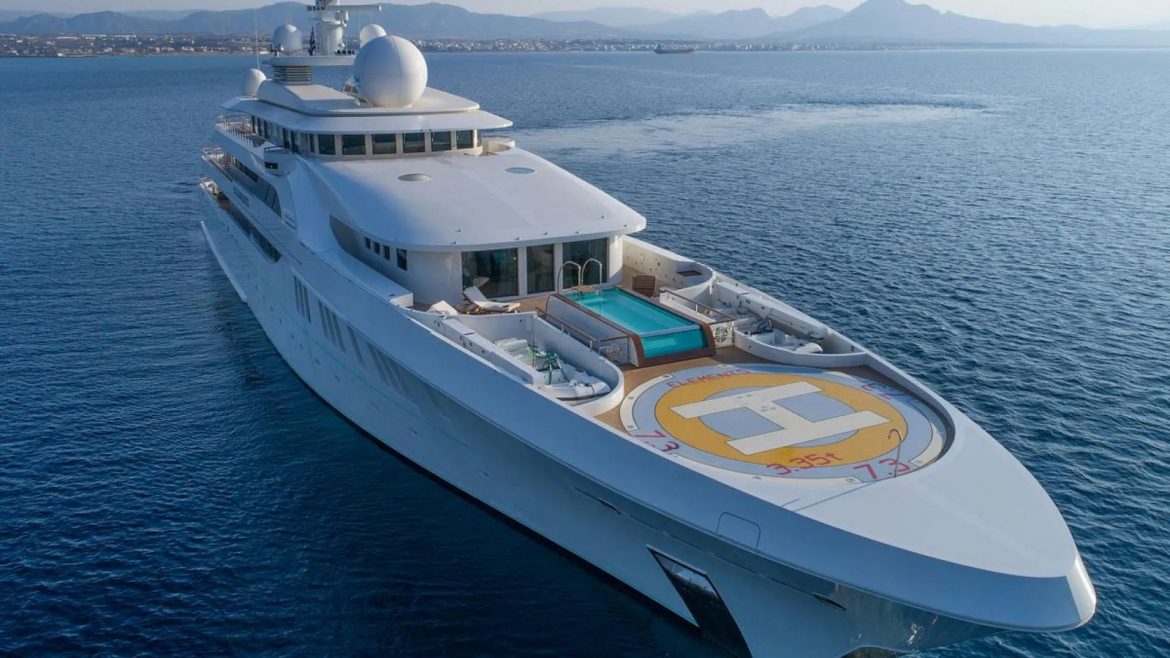
You may also like
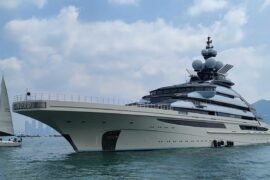
Russian tycoon’s $500 million megayacht, which had once caused a diplomatic rift between the United States and Hong Kong, has gone dark once again. Destined for Seychelles, the vessel has turned off its transponders and disappeared in the Indian Ocean.
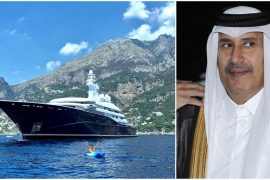
Forget a private jet or a villa – The former Prime Minister of Qatar actually owns this $300 million megayacht – The 436 feet long vessel has one of the largest spa’s on a yacht, a pirate-themed underwater viewing room for the kids, and even a hairdressing saloon.
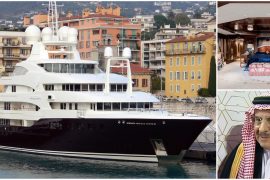
After seizing it last year, Credit Suisse has finally sold Saudi Prince Fahad Bin Sultan’s seized $65 million superyacht
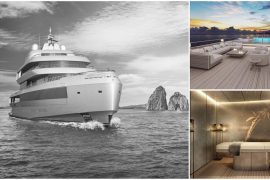
A greek crypto-tycoon has purchased this stunning 236 feet long superyacht designed by Giorgio Armani
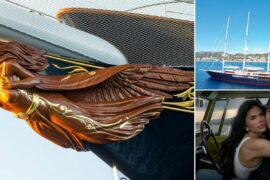
After 6 long months, Lauren Sanchez has clarified that the goddess-like figurehead on Jeff Bezos’ $500 million Koru sailing yacht is not her
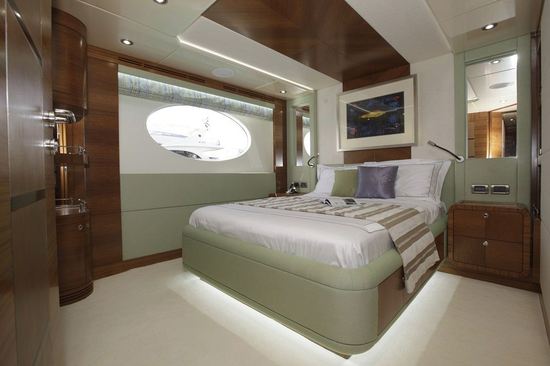
The Majesty 105 superyacht is launched at the 2012 Dubai International Show
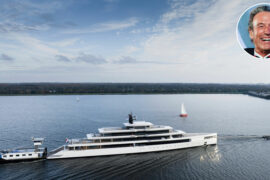
From a truck driver to New Zealand’s richest man. Graeme Hart has showcased his Covid lockdown project, a 338-foot-long superyacht that boasts four Jacuzzis, an extensive swimming pool, a concealed helicopter hangar, a winter garden, and even a hospital.
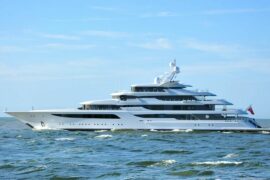
In a landmark move, an oligarch’s seized $217 million superyacht, which was also raided by the FBI, is heading from Croatia to Ukraine, to be sold. The proceeds will be used to rebuild the war-torn nation. But can Ukraine afford the $1 million+ monthly maintenance of such a vessel?
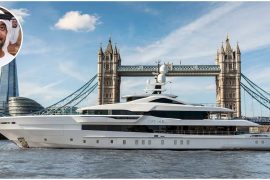
The billionaire CEO of Emirates Airlines is so fond of the moon that he has a 196 feet long lunar-themed superyacht. The vessel is so plush that its interiors are inlaid with palladium and precious stones while a slice of moon meteorite is used for decoration.
Texts Reveal More Russia Ties for Key Anti-Biden Witness
Tony Bobulinski, a former business partner of Hunter Biden, is expected to testify publicly on Wednesday.

Roger Sollenberger
Senior Political Reporter
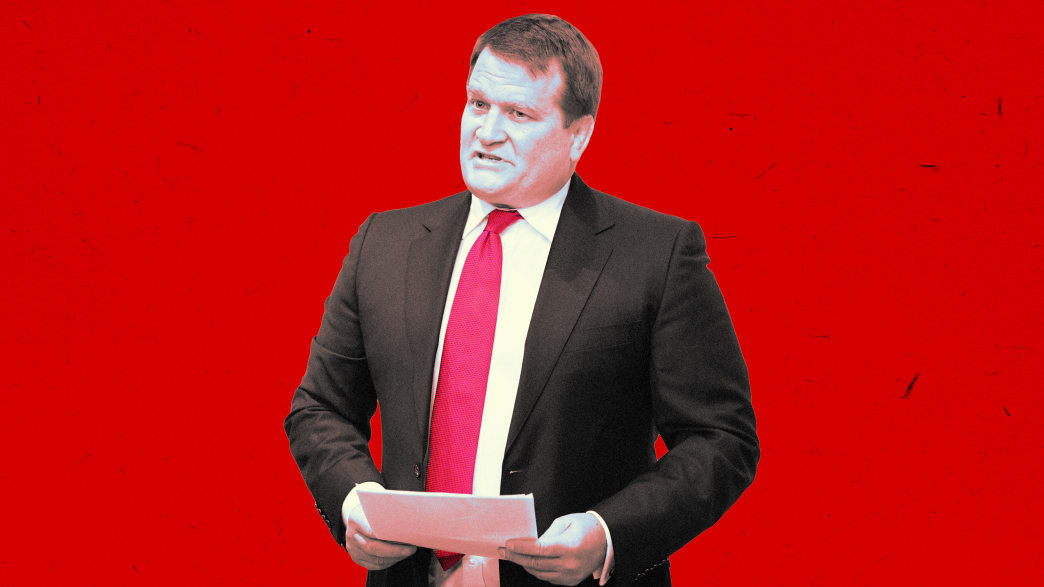
Photo Illustration by Thomas Levinson/The Daily Beast/Getty
House Republican leaders behind the sputtering impeachment inquiry into President Joe Biden scheduled a public hearing on Wednesday to iron out alleged “ inconsistencies ” in witness testimony. But they might want to start with the witness the GOP impeachment team has cited as their “most credible by far.”
Former Hunter Biden business associate Tony Bobulinski has provided testimony riddled with inconsistencies, including statements that contradict claims in the FBI’s write-up of their interview with him just ahead of the 2020 election.
In closed-door testimony last month, Democrats on the House Oversight Committee pressed Bobulinski on those statements, according to a transcript . In response, Bobulinski blamed other people for lying or getting it wrong: the FBI agents who wrote up the interview, old business associates, former White House staffer Cassidy Hutchinson, and reporters at The Wall Street Journal .
Now, House Republicans have scheduled Bobulinski to testify publicly on Wednesday. Hunter Biden and another former business partner rejected offers to appear, leaving Bobulinski as the sole in-person witness. (One other GOP witness—former Biden associate Jason Galanis—will join remotely from federal prison, where he is serving a 14-year sentence for defrauding a Native American tribe .)
This means that Bobulinski’s prior statements will be on the menu again for the Democrats. And not all of his inconsistencies can be chalked up to third-party error.
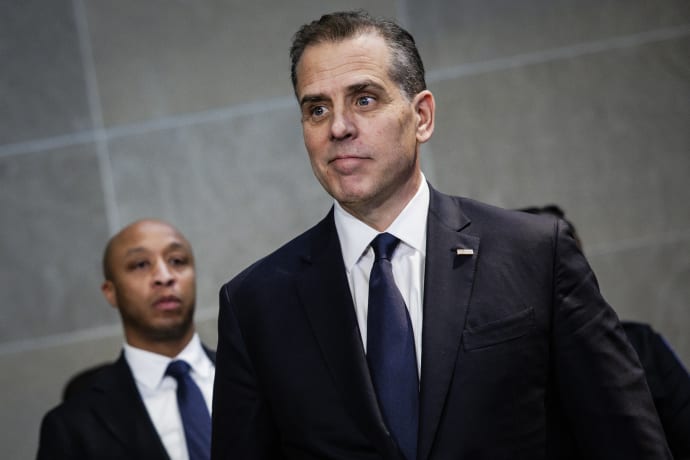
Hunter Biden, after a closed-door deposition before the House Committee on Oversight and Accountability on Feb. 28.
Samuel Corum/Getty
One central issue in the Bobulinski timeline—his long-standing connections to a sanctioned Russian oligarch behind state-controlled energy company Rosneft—appears far more close and complex than he has suggested, including in his House testimony.
Bobulinski was a partner with Hunter Biden and a small circle of other associates in a proposed 2017 investment deal involving their startup entity, called “SinoHawk,” and privately owned Chinese energy firm CEFC. In 2020, Bobulinski went public with claims that the finances involved not just Hunter Biden, but his father Joe Biden, who was out of office at the time of the negotiations.
Republicans have pointed to Bobulinski’s claims as evidence of potential wrongdoing, and his allegations have fueled unproven but widespread speculation about a bribery scandal—even though many of these claims have been debunked , and years of GOP investigations have turned up no evidence of impeachable offenses.
But as the inquiry has unspooled the details surrounding the proposal, Bobulinski’s own connections to Russia have come into clearer focus.
In 2017, while SinoHawk pursued its deal with CEFC—securing an investment of $5 million—CEFC was simultaneously chasing an exponentially bigger deal. That deal involved purchasing a $9 billion stake in Rosneft, the Russian-controlled energy conglomerate whose founder, Viktor Vekselberg, had close ties to Bobulinski, The Daily Beast previously reported.
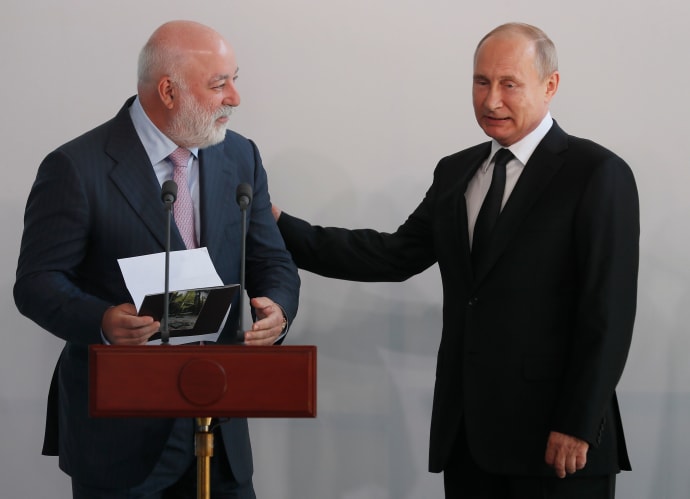
Viktor Vekselberg and Vladimir Putin in 2019.
Sergei Ilnitsky/AFP via Getty
The CEFC-Rosneft negotiations created friction between Bobulinski and Hunter Biden, the text messages show, stemming from Hunter Biden’s aversion to dealing with the sanctioned Russian company . That led to the eventual dissolution of SinoHawk, though CEFC’s investment in Rosneft never came to fruition.
Bobulinski has claimed, including in his testimony last month, that he first learned of the potential CEFC-Rosneft deal from press reports in July 2017, emphasizing that the proposal was never officially recognized until September. He also told FBI agents and House investigators that he grew deeply concerned when he learned about the deal. That specific timeline, Bobulinski told House investigators, “is important to my testimony today.”
But WhatsApp messages —compiled by a nonprofit run by outspoken Hunter Biden opponent and former Donald Trump White House staffer Garrett Ziegler, and confirmed as authentic to The Daily Beast by a representative for Bobulinski—show that Bobulinski had been in a position to know much earlier.
According to those messages, Bobulinski had been physically in Moscow for business discussions involving CEFC’s executive director one month earlier.
“Can you please get confirmation of itinerary of Director Z trip to Russia,” Bobulinski asked a CEFC associate in a May 5 message, referring to CEFC executive director Jian Jun Zang.
“The director is still on the plane, so I have not got any update on the time table in Ru,” the associate replied, adding that CEFC would procure a visa for Bobulinski’s own travel to Russia. “Regarding the Visa, CEFC will issue a letter of invitation to you, plz send me [your] passport copy, a position in a certain company (which you would like the officer to know).”
When the associate clarified that Zang would be in Russia from June 4 through June 7, Bobulinski offered to help with lodging and logistics.
“Are his accommodations and things already setup? Is there anything we can help with?” Bobulinski asked, according to the messages. (Bobulinski made a similar inquests in an earlier message, writing, “We would like to be helpful to the Director and make sure his trip is great, can you please confirm his hotel is all settled and which hotel he is staying.”)
In a separate WhatsApp exchange with Bobulinski days later, another SinoHawk partner mentions the upcoming Russia trip.
“[Z]ang wants to organize with me in Bucharest. I would like to do before Moscow or straight after,” the associate, James Gilliar, allegedly wrote, with Bobulinski allegedly replying, “Ok.” (Gilliar is also the person who sent Bobulinski a link to the public report about the CEFC-Rosneft deal, in July 2017.)
In another message from early June, Bobulinski told Gilliar, “see u in Moscow.” Then, in a separate June 4 exchange, a Romanian businessman asked Bobulinski if they could arrange a conversation “before you fly to Moscow.”
Bobulinski later stated in the messages that he was personally in Moscow in early June.
“Chairman Ye coming to moscow this trip?” Bobulinski asked a CEFC representative in a June 7 message, referencing another CEFC official.
The representative answered that Ye “might come to Moscow in several days but it’s not confirmed yet.” Bobulinski then replied that he would have stayed in Moscow longer, according to the messages.
“OK we would have stayed to spend time with him and the Director if we had known, it isn’t 100% confirmed yet though,” he wrote.
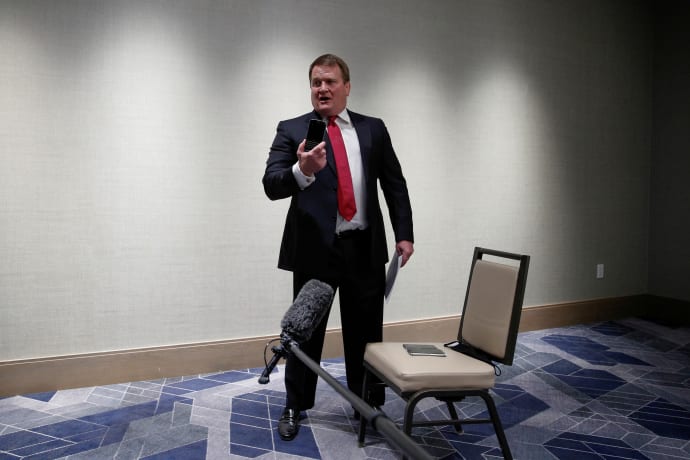
Tony Bobulinski speaks to journalists ahead of a debate between Joe Biden and Donald Trump in 2020.
Tom Brenner/Reuters
While all SinoHawk partners appear to agree that CEFC’s involvement with Rosneft tainted and ultimately killed the SinoHawk project, their interpretations of those events vary.
In his 2020 FBI interview, Bobulinski told agents that he’d first grown “concerned” about Hunter Biden’s participation in the CEFC-Sinohawk negotiations “after learning of CEFC’s involvement in Rosneft,” news that first came out on Independence Day in 2017. (A WhatsApp message shows Bobulinski receiving this information that day, from Gilliar.)
According to Bobulinski’s account, he thought it was strange that CEFC could manage a $9 billion purchase while slow-rolling its much smaller $5 million investment in Sinohawk. Group WhatsApp messages included in House impeachment releases show that Rosneft and Bobulinski’s oligarch ties gave rise to disputes between Hunter Biden and Bobulinski, The Daily Beast previously reported.
The circumstances surrounding the collapse of the deal, Bobulinski has said, are what led him to come forward in the first place. He has claimed that he first learned Hunter Biden cut him out of the CEFC deal when he read a Senate report released in late 2020, telling the FBI that in retrospect, the Rosneft involvement “didn’t add up” to him.
But WhatsApp messages show that Hunter Biden also bristled at the Rosneft deal—specifically because of Bobulinski’s business ties to Moscow and Vekselberg.
When Bobulinski first agreed to what became the SinoHawk deal—in spring 2016—he did not know he was going into business with Hunter Biden, but a “prominent American family;” impeachment records show he first became aware of Hunter Biden’s role in February 2017. And in the context of 2017, Bobulinski’s Russia connections were nuclear.
In 2014, while Joe Biden was vice president, the U.S. government sanctioned Rosneft in response to Russia’s first unlawful incursion into Ukraine. Additionally, Moscow had just interfered in the 2016 election on Trump’s behalf —with Rosneft’s role in Christopher Steele’s dossier garnering intense speculation —and Hunter Biden was wary of anything involving the Russian government. Hunter Biden aired these frustrations in text messages released by House Republicans, and WhatsApp messages between him and Bobulinski show the two men in fierce arguments months before the SinoHawk project fell apart.
On May 19, 2017, Hunter Biden and Bobulinski had a confrontation over the SinoHawk deal. WhatsApp messages show Biden invoking Bobulinski’s ties to Vekselberg, blasting him as immature and insulting, and at one point threatening to break his jaw.
“I’ll say it one final time. I don’t care how much money you’ve made what teams you were captain of or how many soulless oligarchs you call friend,” Hunter Biden wrote. “Money doesn’t interest me winning is ephemeral and fleeting and I have no interest spending my days on a super yacht measuring my dick with the people on the super yacht next to me.”
Biden continued, “I care about one thing. My family. And your demands make me uncomfortable and you’re [sic] insults remind me of the shit the captain of the lacrosse team said to me in college about my dad right before I broke his fucking jaw. So you’re [sic] choice Tony act like a child and take all your millions of marbles home and throw them at me from afar or sit down like men do and have a discussion face to face. One request though stop the 5th grade group text insults—Jesus my daughters texts are more cogent and mature.”
Bobulinski replied that he and “all the partners around the table” were “trying to protect u and your family” [sic]. Bobulinski also said that if Hunter Biden ever brought the deal up to his father, he’d likely be waved off.
“[A]nd to add to it, if you are so worried about your family, you wouldn’t be doing this because as u said, all of your dad’s lawyers and any lawyer would advise you and Jim not to touch this with a 100 foot pole,” Bobulinski wrote, referencing Hunter Biden’s uncle, James Biden, who was also involved in SinoHawk.
The deal, of course, fell through. Instead, a separate entity that Hunter Biden co-founded with Chinese investors received $5 million from a CEFC affiliate in August 2017. That company paid Hunter Biden $500,000 up-front, followed by monthly consulting fees of $100,000—payments that the GOP has cast in misleading terms .
Last week, CNN reported that the impeachment inquiry has stalled amid a series of embarrassing and escalating setbacks. While the most damaging blow came in the form of the indictment of an FBI informant last month for lying to his handlers, CNN also reported that Biden’s recent closed-door testimony also impressed Republicans, leaving Oversight chair Rep. Jamie Comer (R-KY) Comer “on his own island.”
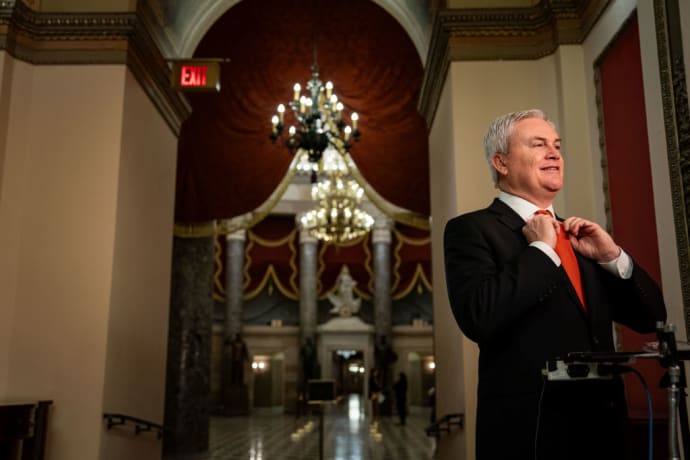
Rep. James Comer, chairman of the House Oversight and Accountability Committee
Kent Nishimura/Getty
No further witness interviews have been scheduled, and Republicans, who control the House, don’t have enough votes to impeach Joe Biden, CNN reported. There’s no partisan consensus on an exit strategy, either, and while Comer has advocated for criminal referrals, House Judiciary Chair Jim Jordan and House Speaker Mike Johnson are less enthusiastic, according to CNN.
Bobulinski didn’t return The Daily Beast’s comment request, and Hunter Biden’s legal team declined to comment. In response to questions, an Oversight Committee spokesperson provided a statement challenging Hunter Biden to appear for a public hearing.
“Tony Bobulinski is willing to appear before the Oversight Committee in public to answer questions about his previous testimony and anything else members want to ask him,” the statement said. “If Hunter Biden was so confident in his previous testimony, he’d do the same. But it appears Hunter Biden is afraid to testify alongside his former business associates.”
Hunter Biden shot down the GOP’s invitation to join Bobulinski at Wednesday’s upcoming hearing, with his attorney Abbe Lowell dismissing the proceedings as a “ carnival side show .” Another former business partner, Devon Archer—a key witness for the GOP whose previous testimony undercut their central allegations —also rejected the invitation to testify this week, citing a “patently unreasonable” request.
In last month’s closed-door interview, House Democrats peppered Bobulinski with questions seeking to highlight and dismantle his shifting narratives. Their inquiries zeroed in on several factual discrepancies, chiefly concerning the details surrounding Bobulinski’s presence at a 2017 business meeting in Miami, as noted in the FBI interview. Bobulinski’s written testimony admits that he did not attend the meeting, blaming the half-dozen FBI agents in the interview for a “single note-taking error.”
But as Democrats pressed Bobulinski, that “single note-taking error” morphed into a broader claim, about “numerous statements in [the FBI notes] that are incorrect.” The testimony transcript illustrates a series of contentious exchanges, with Democrats expressing open skepticism that the inconsistencies were merely the fault of FBI agents taking bad notes, and reprimanding Bobulinski for what Democrats said was a combative and “disrespectful” tone.
Those disputed claims include the FBI’s notes that Bobulinski told them he had personally witnessed a Chinese business official giving Hunter Biden a diamond at a Miami meeting in 2017—a note that Bobulinski called “a lie.” The inconsistencies also include the timeline of when Bobulinski first learned of the Chinese company involved with the business deals, with Bobulinksi telling Democrats that the FBI’s notes about that timeline were also “incorrect.”
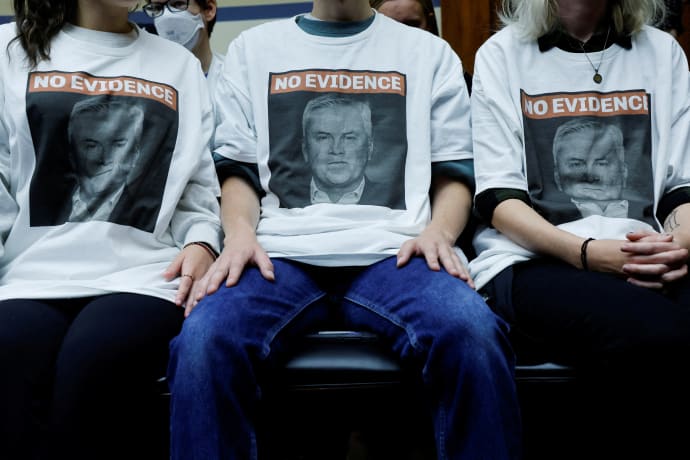
Attendees of a House Oversight and Accountability Committee hearing last fall made their views clear.
Jonathan Ernst/Reuters
A third point of contention was whether Bobulinski had visited the White House the day before his FBI interview. (The write-up notes that Bobulinski was tested for COVID specifically because of a White House visit the prior day.) In response, Bobulinski—flanked by Donald Trump’s 2020 campaign lawyer Stefan Passantino—told Rep. Dan Goldman (D-NY) that the COVID test was for an event in Nashville, Tennessee, adding that he has “never” visited the White House and slamming the detail as a “big, clear mistake” by the multiple FBI agents who had documented the meeting.
The claims of numerous factual errors on the FBI’s part beggared belief among Bobulinski’s Democratic interrogators. The accuracy is paramount, because Bobulinski’s FBI interview has for years been held up by Hunter Biden’s critics as official documentation for the bombshell claim that Hunter Biden had arranged for a 10 percent cut for “the big guy,” Joe Biden—an allegation that has since been discredited . (Bobulinski sat for that 2020 FBI interview voluntarily, but refused to provide his electronic devices for imaging.)
After Bobulinski implicated Joe Biden directly in the deal, Gilliar—a SinoHawk partner— told The Wall Street Journal , “I would like to clear up any speculation that former Vice President Biden was involved with the 2017 discussions about our potential business structure. I am unaware of any involvement at any time of the former vice president. The activity in question never delivered any project revenue.”
Separately in the hearing, Bobulinski also attacked Cassidy Hutchinson’s claims about him in her recent memoir. Hutchinson wrote that she saw Bobulinski meet with former Trump chief of staff Mark Meadows while wearing a ski mask at an October 2020 campaign event, where Meadows gave Bobulinski an envelope of some kind. Bobulinski, however, called her a “fraud and a liar,” denied being handed anything, and denied wearing a ski mask.
In response, Hutchinson released what she said was a photo from the event showing Meadows next to Bobulinski in a black ski mask. Days later, Bobulinski sued Hutchinson for defamation.
When the testimony was over, House Oversight minority leader Rep. Jamie Raskin (D-MD) released a statement characterizing the hearing as “farcical” and rebutting many of Bobulinski’s claims and explanations. In November, Hunter Biden’s legal team filed a criminal referral asking the Justice Department to investigate Bobulinski for potentially lying to federal agents in his 2020 interview.
Republicans, however, defended their witness. In interviews after the hearing, Comer threw his lot in with Bobulinski.
“Tony Bobulinski’s the one credible guy in the Biden orbit,” Comer told Newsmax in one interview . “I will admit with Jamie Raskin that there are a lot of people involved with the Bidens that weren’t credible. That’s a reflection on the Bidens, not me. Tony Bobulinski’s the one good guy, the one honest guy, the one credible guy, and he did a great job in the transcribed interview yesterday.”
Got a tip? Send it to The Daily Beast here .
READ THIS LIST

New texts raise questions about another GOP witness against Biden: report
A nother key witness in the House Republican impeachment inquiry of President Joe Biden appears to have deeper ties to Russia than previously known.
Hunter Biden's former business associate Tony Bobulinski will publicly testify Wednesday to clear up alleged “ inconsistencies ” in what he's already told the inquiry, but the investigation has already revealed this witness had deeper knowledge of a deal between the privately owned Chinese energy firm CEFC and a sanctioned Russian company than he has let on, reported The Daily Beast .
Bobulinksi's longstanding ties to Russian oligarch Viktor Veksleberg appear to be more close and complex than he has suggested in his House testimony, and texts show that he was more closely involved in a proposed 2017 investment deal involving CEFC and a startup known as "SinoHawk."
Want more breaking political news? Click for the latest headlines at Raw Story.
He went public in 2020 claiming the finances of that deal involved Hunter Biden and his father, who was not in office at the time of the negotiations, and Republicans have used Bobulinski's accusations as the basis of their impeachment inquiry, but many of his claims have fallen apart under closer scrutiny.
Bobulinski testified last month that he first learned that CEFC was pursuing an even larger deal with the state-owned Rosneft, the oil conglomerate founded by Vekselberg, from press reports in 2017, when the Chinese company was also negotiating with SinoHawk, and he told both lawmakers and the FBI that was deeply concerned when he learned of the Rosneft deal.
But WhatsApp messages gathered by former White House staffer Garrett Ziegler, who claims to be working with GOP lawmakers in the Biden probe and has been sued by Hunter Biden over his infamous laptop, show that Bobulinski had actually been in Moscow to discuss business with CEFC's executive director a month earlier.
ALSO READ: Letter carriers face bullets and beatings while postal service sidelines police
“Can you please get confirmation of itinerary of Director [Jian Jun Zang] trip to Russia,” he asked a CEFC associate in a May 5 message, which a representative of Bobulinski confirmed as authentic.
“The director is still on the plane, so I have not got any update on the time table in Ru,” the associate replied, adding that CEFC would procure a visa for Bobulinski’s own travel to Russia. “Regarding the Visa, CEFC will issue a letter of invitation to you, plz send me [your] passport copy, a position in a certain company (which you would like the officer to know).”
Bobulinski offered to arrange lodging and logistics when the associate confirmed Zang would be in Moscow the following month, and he discussed that Moscow trip with another SinoHawk partner.
“[Z]ang wants to organize with me in Bucharest. I would like to do before Moscow or straight after,” said that associate, James Gilliar, who is the individual that sent Bobulinski a link to the public report about the CEFC-Rosneft deal in July 2017.
The SinoHawk partners all seemed to agree that CEFC’s negotiations with Rosneft ultimately killed their project, although their interpretations vary, but the WhatsApp messages show Hunter Biden objected to Bobulinski's links to the sanctioned Russian company and Vekselberg – and even threatened to break his jaw.
“I’ll say it one final time. I don’t care how much money you’ve made what teams you were captain of or how many soulless oligarchs you call friend,” Hunter Biden wrote. “Money doesn’t interest me winning is ephemeral and fleeting and I have no interest spending my days on a super yacht measuring my dick with the people on the super yacht next to me.”
“I care about one thing. My family," Hunter Biden said. "And your demands make me uncomfortable and you’re [sic] insults remind me of the s--t the captain of the lacrosse team said to me in college about my dad right before I broke his ... jaw. So you’re [sic] choice Tony act like a child and take all your millions of marbles home and throw them at me from afar or sit down like men do and have a discussion face to face. One request though stop the 5th grade group text insults — Jesus my daughters texts are more cogent and mature.”
Bobulinski assured Hunter Biden that all their partners were “trying to protect u and your family,” and he said that if he was so worried about his family he wouldn't touch the deal "with a 100 foot pole."
The deal ultimately fell through, and a separate entity Hunter Biden co-founded with Chinese investors got $5 million from a CEFC affiliate in August 2017, which paid him a one-time retainer fee of $500,000 plus $100,000 per month in consulting fees.
Recommended Links:
・ Democrats plan to upend Biden impeachment inquiry by calling Giuliani henchman to testify
・ GOP's star witness says he 'has the receipts' to prove Joe Biden's business dealings
・ GOP's star witness in Biden impeachment probe linked to Russian oligarch: report
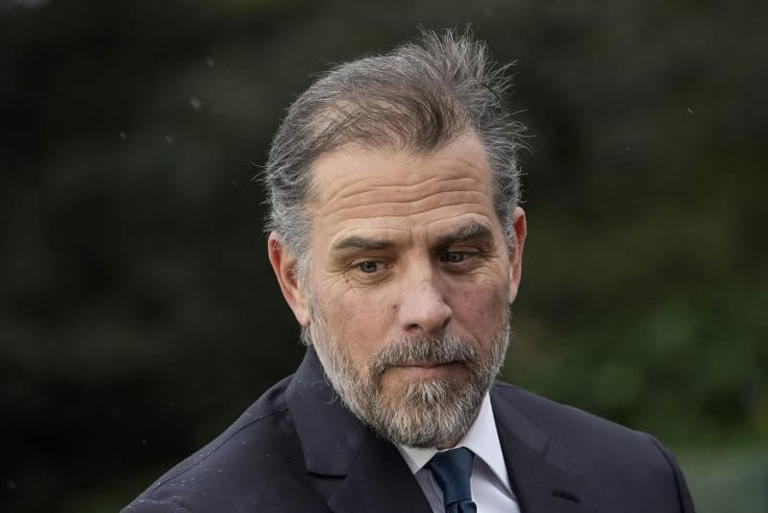

IMAGES
COMMENTS
The 511-foot "Dilbar" yacht in Weymouth Bay, UK, in June 2020. Finnbarr Webster/Getty Images. Germany has impounded the "Dilbar," a superyacht connected to a Russian oligarch in Hamburg ...
The yacht Lena, belonging to Gennady Timchenko, an oligarch close to Russian President Vladimir Putin, in the port of San Remo on the Italian Riviera on March 5. Andrea Bernardi / AFP - Getty Images
The lawyer argued there was no evidence the yacht represented the proceeds of crime, and claimed it actually belonged to a different billionaire Russian oligarch. Eduard Khuadainatov is the former ...
France seized Amore Vero, a 281-foot megayacht linked to oligarch and politician Igor Sechin, on March 3. The yacht, Amore Vero, is estimated to have a value of $120 million. It has a swimming ...
Several yachts reportedly owned by Russian oligarchs have been docked at a port in Barcelona, including the Solaris, which has been tied to Roman Abramovich, the billionaire who announced ...
The Lady M, a yacht owned by Russia's wealthiest oligarch, was also seized in Italy. A media advisor to Italian Prime Minister Mario Draghi confirmed in a tweet that the superyacht known to be ...
June 27, 2022 / 3:40 PM EDT / CBS/AP. A $325 million superyacht seized by the United States from a sanctioned Russian oligarch arrived in San Diego Bay on Monday. The 348-foot-long (106-meter-long ...
The $90 million 255-foot yacht, named Tango, is owned by sanctioned Russian oligarch Viktor Vekselberg, who heads the Renova Group, a Russian conglomerate with interests in metallurgy, machinery ...
By The Associated Press. PALMA DE MALLORCA, Spain — The U.S. government seized a mega yacht in Spain owned by an oligarch with close ties to the Russian president on Monday, the first in the ...
U.S. federal agents and Spain's Civil Guard are searching the yacht owned by a Russian oligarch. The yacht is among the assets linked to Viktor Vekselberg, a billionaire and close ally with Russia's President Vladimir Putin, who heads the Moscow-based Renova Group, a conglomerate encompassing metals, mining, tech and other assets, according ...
1 of 3. Lady Anastasia, reportedly owned by Russian oligarch Alexander Mikheyev, was detained by Spanish authorities in Mallorca on Tuesday, March 15. The 48-meter long yacht, which sails under a ...
By Robert Frank, CNBC. A mega-yacht seized by U.S. authorities from a Russian oligarch is costing the government nearly $1 million a month to maintain, according to new court filings. The U.S ...
The U.S. seized Russian oligarchs' superyachts. ... So I went to the Monaco Yacht Show at the end of September and got on board one of the most luxurious, expensive superyachts. It was just the ...
Here's what it means to be an oligarch 01:31. Two days after the Department of Justice announced it assisted Fijian police in seizing a $300 million yacht allegedly owned by a sanctioned Russian ...
Russian oligarchs move to preserve financial assets 02:21. Yachts owned by Russian billionaires are on the move as the U.S. and its allies seek to hunt down the assets of Russia's wealthiest in ...
The oligarch has used his position at Transneft to build a business and real estate empire, which reportedly includes sponsoring an extremely fancy palace that's said to be personally used by ...
According to SuperYachtTimes.com, the Amadea has a 392,000-liter fuel tank. That works out to about 103,555 gallons, so it could cost $766,307 or so just to fill up. A $325 million 350-foot yacht ...
Published 14 mins ago. A mega-yacht seized by U.S. authorities from a Russian oligarch is costing the government nearly $1 million a month to maintain, according to new court filings. The Justice ...
On Sept. 3, 2020, the staff of a $90 million yacht placed an order with a U.S. company for a set of luxury bathrobes that came to $2,624.35. For roughly two years before that, according to federal ...
About a week before Russia's invasion, Dasha Zhukova partied with Karlie Kloss. She now faces scrutiny for $96 million in New York property transferred to her by her oligarch ex-husband.
Russian oligarch Roman Abramovich, ... - Ferretti, a Forli, Italy-based luxury yacht builder, plans to price shares at HK$22.88 ($2.92) on the Hong Kong stock exchange, according to Bloomberg. A ...
In November, he claimed that cronies of Mr. Zelensky bought two yachts — Lucky Me and My Legacy — for $75 million. His evidence, like Mohamed al-Alawi's, includes photographs of the vessels ...
Elements yacht is powered by twin MTU engines, cruising at 15 knots, with a maximum speed of 18 knots. Also read - The Ark Angel LSV is the latest Carbon Neutral Emax Megayacht from Sauter. ... While Fiji hurriedly seized sanctioned oligarch Suleiman Kerimov's $325 million Amadea superyacht at the request of the United States. The tiny island ...
VIDEO 02:41. Yachts, villas owned by Russian oligarchs seized as crackdown continues. "The oligarchs could reasonably argue 'I acted within the laws that were in place in Russia and in Europe ...
Group WhatsApp messages included in House impeachment releases show that Rosneft and Bobulinski's oligarch ties gave rise to ... spending my days on a super yacht measuring my dick with the ...
・GOP's star witness in Biden impeachment probe linked to Russian oligarch: report Hunter Biden, son of U.S. President Joe Biden, attends the Easter Egg Roll on the South Lawn of the White House ...
Aeolian Yacht Club, Alameda, California. 767 likes · 3 talking about this · 1,289 were here. Established in 1906, Aeolian Yacht Club is a neighborhood harbor on tranquil San Leandro Bay